#(what if our connection fundamentally changes us both and the narrative too)
Text
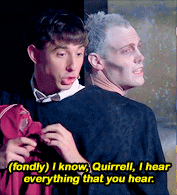





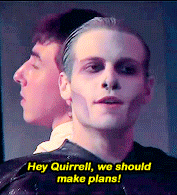
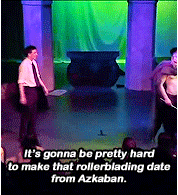
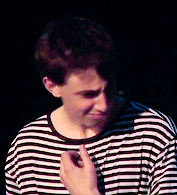
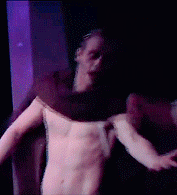
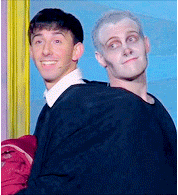
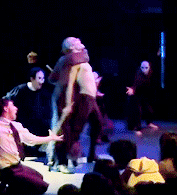


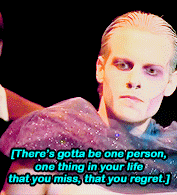
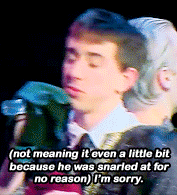
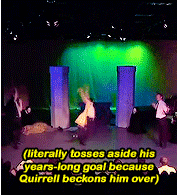



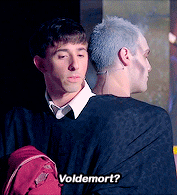
We're quite a kooky couple, you'll agree.
dynamics I could watch forever
Joe Walker as Voldemort & Brian Rosenthal as Quirrell
A VERY POTTER MUSICAL (2009) & A VERY POTTER SENIOR YEAR (2012)
written & directed by Nick Lang & Matt Lang
lyrics by AJ Holmes
#starkidedit#Starkid#Team Starkid#Quirrelmort#Quirrellmort#AVPM#A Very Potter Musical#my gifs#lizziesdynamics#(what if our connection fundamentally changes us both and the narrative too)#(also we're both men and we're literally stuck in a comedic bit)#anyway congrats to these two for still being the only halfway decent starkid mlm relationship in *checks watch* fourteen years#happy six years of giffing to me here's the dynamic that pushed me to properly learn
565 notes
·
View notes
Text
Notes on Roman Homosexuality by Craig Williams, chapter 4! In today's installment, what is "manliness"? What did it mean for a man to be "effeminate"? Plus: not only are gender roles bullshit, but they're also connected to classism, imperialism and xenophobia!
Masculinity and femininity are social constructs. That means they are not inherent properties of our bodies, but judgments and categories people put on us. These social constructs aren't limited to physical sex, either - they tend to expand into elaborate, restrictive codes of dress, career, hobbies, speaking style, and every other aspect of daily life.
These social constructs are fragile and ever-changing. A Roman man wasn't a man solely because he had a dick. He had to reinforce his masculine persona by behaving in masculine ways, lest he be attacked as "effeminate" and lose other people's respect and trust.
Roman masculinity centered around dominance and control. Masculinity was realized by exerting power over your wife and children, by aggression in battle and the courtroom, and by the subjugation of slaves and non-Romans.
However, a Roman man was also supposed to be the master of his own desires, and a man who was too self-indulgent with food, sex, nice clothes, or other pleasures could get called effeminate. In fact, effeminate men were often stereotyped as womanizers. Other times they were accused of sleeping with men and women alike, or of being both penetrator and penetrated. The emasculation came not from sleeping with men per se, but from being a "slave to one's desires," and losing one's inhibitions.
(Aside #1 - I wonder if this partly accounts for why Stoicism became more popular among Roman men than Epicureanism?)
In fact, the masculine rejection of being "too emotional" was so intense that a Roman man could get called effeminate for falling in love with a woman. This inspired much of Octavian's propaganda against Mark Antony: that she "enslaved" him with her feminine wiles, and he in turn gave up his masculine virtue and his Romanness. Similarly, Pompey's contemporaries made fun of him for being excessively affectionate to his wife Julia (Caesar's daughter).
And oh yes, Romanness was equated to masculinity, and masculinity with virtue. The Latin word for virtue literally means "manliness," and the Romans saw themselves as being uniquely manly compared to the "soft, self-indulgent" men of other cultures. This later became a justification for subjugating those cultures: it was only natural that the "manly" nation ruled the "womanly" ones, right?
(Aside #2 - Reminds me a bit of how racial stereotypes today may emasculate marginalized men, or conversely, portray them as brutish/violent/hypersexual. I wonder if some of this may be a legacy from Roman ethnocentrism? Then again, it may not be a Roman-specific thing. This might just be something that imperialist/colonialist powers in general do to justify themselves.)
(Aside #3 - This must have interacted in interesting ways with the heavy immigration and multiculturalism in Rome! How do you prop up masculinity as a "Roman" virtue when every neighborhood speaks a different language? How much would the masculine ideal shift in response to new cultures coming in? And how much of our picture of "Roman gender roles" only reflects the upper-class Latin writers, leaving out other Roman narratives?)
Although willingly being penetrated could make a man effeminate in Roman eyes, the stereotype of the "effeminate" was much broader, and not all effeminate men were assumed to sleep with other men. Excessive attention to grooming, enjoying women's company (romantically or platonically), showing fear of death, even crying for a lost wife could all be seen as effeminate. The "problem" of effeminacy was not fundamentally a stigma toward gay men, but toward any man who was not seen as performing masculinity correctly.
In practice, any man could get accused of effeminacy, and Roman politicians would happily make up stories about their rivals if no evidence existed. If you weren't aggressive or dominant enough, you were accused of being too soft; if you were aggressive and dominant, you'd be accused of having no manly self-control.
Honestly, this chapter made me feel sorry for Roman men. It sounds like such a dreadfully unhealthy environment, not even being allowed to love your spouse too openly or grieve for your child without being seen as weak. I have to wonder if such rigid gender norms could themselves be traumatic - they certainly can be for trans people, and for women today.
Sometimes I'm amazed the Roman republic survived as long as it did. In between the slavery, the corruption, the generational trauma, and all the garbage gender roles, it feels like a culture that would bring out the worst in people. And yet, on the eve of Caesar and Pompey's civil war, 94% of the Senate voted for disarmament and peace.
Maybe I shouldn't be so surprised. Many of the sexist prejudices Williams outlined have parallels even in my own culture. And yet I've also known men who rose above that. Who understood that kindness isn't a weakness, and aggression isn't strength. It's hard to scrub all the sexist nonsense out of our brains, but gods, it's such a relief. Life is so much richer when you can just be yourself, and let other people be themselves.
I'm sure there were Romans who tried very hard to be themselves, too. And others who, even if their view was colored by the prejudices of their time, they at least tried to be kind and do right by others. That's all any of us can do, really.
84 notes
·
View notes
Text
random acts
a chaotic, uncertain, and disorderly syllabus [x]

why fish don't exist & “the eleventh word” by lulu miller
book and essay by npr journalist lulu miller on the search for order in a world of chaos. miller was inspired by the story of naturalist david starr jordan, whose collection of carefully classified and labeled fish specimens was scrambled in an earthquake in 1906. while researching his quest to rebuild his life's work she discovers surprises about his life that yield insights about her own search for order and meaning. “the eleventh word” follows her family after the onset of the covid-19 pandemic and the publication of why fish don’t exist, when her young son learns the very word “fish” that she attempts to complicate in her book.
chaos: the making of a new science by james gleick
the first popular science book on chaos theory aimed at non-physicists and non-mathematicians, published in the 1980s by science reporter james gleick. presented chronologically, chaos begins with the story of meteorologist edward lorenz's experiments with a weather simulator and expands to cover the ubiquity of chaos in fields like astrophysics, ecology, economics, geometry, and biology; as well as the ways the study of chaos has altered scientific paradigms.
"the lava lamps that help keep the internet secure" by tom scott
video in which youtuber tom scott visits the web security company cloudflare, where a camera photographs the changing patterns in a row of lava lamps to generate unpredictable values for their cryptography. in another office, a receipt printer generates outputs such as magic 8-ball responses, mazes, and sudokus from their random data.
"just randomness" by michael marder
essay in real life magazine by philosopher michael marder about ethics and algorithmic decision-making, in which he argues that algorithms should not recuse us from making fundamental decisions about justice. by trying to use randomness to create fairer systems, marder writes that we are prone to the pitfalls of perceived randomness-- particularly at the hands of the learned gender, race, and class biases absorbed by artificial intelligence.
"what does chaos theory have to do with art?" by dean wilcox
paper by culture writer dean wilcox on the connections between chaos theory in physics and image/process-driven work in art. wilcox uses the plays of robert wilson and the films of david lynch, both of which eschew predetermined narrative structures, as artistic corollaries for chaos science. for an analysis on art and entropy focusing on the work of many 1960s artists and architects, see robert smithson's "the new monuments and entropy." (thank you to @vis-uh-vis for the suggestion!)
"divination and game theory" by john henrich
short section of evolutionary biologist john henrich's book the secret of our success, which as a whole explores various ways that cultural evolution may advantage the human species. he touches on several examples of how random divination techniques, such as augury or osteomancy, are an evolutionary boon in situations where random decisions are valuable. for more thoughts see "paul the octopus' death and other thoughts on animal oracles" by alice dos reis from the dutch socio-political research project, schemas of uncertainty (many other interesting pieces here too!)
"the elusive apple of my i," "consciousness = thinking", "a courteous crossing of words," & the final pages of i am a strange loop by douglas hofstadter
a selection from cognitive scientist douglas hofstader's book on consciousness, i am a strange loop. these parts are dedicated to pondering how our coherent sense of self is established in spite of the chaotic "mass of seething and churning” at the level of cellular structures or subatomic particles. (note: brief references are made to concepts from elsewhere in the book, notably epi from ch. 7 and careenium from ch. 3 in the full text. thanks to @calliopecantaloupes for pointing me to this!)
alan watts on the myopic view of the world
lecture by theological writer and speaker alan watts on the common western perception of the universe as chaotic, alien, and unsympathetic. he explains how we might expand our "myopic" view of life, which focuses on our individual egos and voluntary actions, to see a larger order of magnitude in which the self and environment depend harmoniously on each other.
322 notes
·
View notes
Note
What do you mean by "bad adaptation?" I would say that haunting of hill house is maybe an inaccurate? adaptation, or like maybe subversive adaptation is better, but it's still a good adaptation. Ig I'm curious if by bad adaptation you mean it doesn't match the source material in terms of story or in terms of narrative meaning or both?
while i enjoy flanagan's hill house and think it carries enough of the core themes to have a passing connection with the source material, i ultimately believe it works much better as an original story rather than as an adaptation. "bad adaptation" is definitely an oversimplification for the sake of a meme lmao - unsuccessful is a little closer to what i mean, which i'll explain in more detail below.
first, i want to clarify that analysis of book-to-screen adaptation that only considers 1:1 story accuracy (called "fidelity" by adaptation theorists) when judging the final product's merit is often super myopic. many adapters seek to faithfully recreate the story in a new medium using their own artistic skills, but other adapters like our boy mike flanagan employ more artistic freedom.
to adapt hill house, he changed the basic plot/character elements and explored the nuclear family in more definitive terms than the novel. he also set the story in contemporary times, allowing him to modernize the story. this form of adaptation is totally legitimate and can work amazingly, but i believe it requires a certain recognizability to be truly successful.
here is where i believe flanagan went a few steps too far. his hill house is a good story, but it's a fundamentally different story from jackson's hill house. (this is a whole book ahead, i'm so sorry.)
the characters
again, it's completely okay for adaptations to change up the characters + their dynamics. some works combine characters or remove them altogether if they feel their presence isn't necessary for the version of the story they're trying to tell. but the hill houses have an almost entirely different set of characters, with entirely different dynamics.
in the books, a scientist interested in paranormal phenomena contacts individuals with recorded experiences to explore hill house alongside him and the owner's son, luke sanderson. these individuals are eleanor "nell" vance and theodora, who doesn't have a last name. other characters include the caretaker, mrs. dudley, mrs. montague—the scientist's ouiji board-obsessed wife—and arthur, who works for mrs. montague. the characters bond as they discuss the house's history, their own backgrounds, and the origins of supernatural phenomena. meanwhile, hill house slowly ingratiates itself in nell, who's mourning the loss of her mother.
meanwhile, the tv show centers around the crane family, who move into hill house to renovate and eventually flip the property. the show chronicles their tragic interactions with the house—which resulted in the death of olivia crain, the family's matriarch—alongside the house's robust, terrible history. it also chronicles the crain family in current day after the youngest sibling, nell vance nee' crain completes suicide in the house. throughout the season, we see the crain family learn to deal with their tragic past, their ghosts, and the stories they tell each other to cope.
the tv show's story works really well for its medium, but it's a different story. while some core themes stay the same, they're approached from very different angles.
the house
until the very last episode, i would have argued that the house is the most successful aspect of flanagan's adaptation. it's big, scary, and wrong-looking. you don't want to walk into this house. the angles are quite literally wrong. the addition of actual apparitions complement book!hill house's tendency to entrap its victims and haunt them until they eventually join its history.
olivia crain assumes the role of book!nell in the flashbacks; the idea of a proper home/family drives their internal arcs in both books, with some key differences. nell receives the letter from dr. montague about hill house after losing her mother, whom she took care of her entire adult life. nell and her mother eventually resented each other, and this resulted in mach 10 complicated grief for nell, who suddenly has no place and no one to call her own, to call home. she arrives at hill house ostensibly to search for this place and her fears of eternal loneliness drive her spiral.
in flanagan's hill house, olivia crain's fears over her children drives her spiral. the house ostensibly sends her a premonition of nell's death, leading her to believe the house (and the world outside) will kill her children. in desperation, she tries to kill nell and luke. while these internal arcs are demonstrably different, there is also a through line that allows book readers to recognize olivia as the "nell" figure. this was quite good and fun, aside from my issues with olivia crain's character and how flanagan uses the theme of motherhood. that's for another essay.
HOWEVERRR the last episode happened. the crain kids reunite with their sister, leave their dad in the house, and even see the dudleys reunited with their murdered daughter. afterward, the crain kids live happily. flanagan gave hill house a redemption arc, dismantling the fear from the previous episodes in one ten minute montage. at the end of the book, nell dies and the book ends by repeating the opening line. hill house has stood for a hundred years, and will stand for a hundred more.
a thousand essays could be written on this line alone. does this refer to the perceived permanence of the nuclear family? will humans always destroy themselves if they can't confront the immovable haunted house in their own lives? and so on. you can't unhaunt hill house without writing a fundamentally different haunted house.
theo and nell
in jackson's hill house, the relationship between theo and nell are arguably the heart of the story. the majority of nell's interactions are with theo, including the main "haunting" of the book - when the ghost rattles the walls and door of nell's room. we watch nell become equal parts entranced with theo and resentful of her perceived freedom. she's drawn to theo's vivaciousness and regrets that she's so meek in comparison. she later dreams of living with theo, who gently shuts her down, sending nell further into the spiral that eventually leads to her death. theo is also the last person nell touches when she tries to leave hill house. while i read their interactions as super mega gay, there are many alternative readings. either way, nell and theo are inextricably linked in the book.
in flanagan's hill house, theo and nell are siblings. this automatically changes the relationship and, obviously, removes any possibility of romantic feelings. the most salient parallel is how nell tries to reach out to theo for help; her rejection pushes nell further towards her deadly return to hill house. (not that it was actually her fault, but theo felt like it was her fault.) otherwise, flanagan nell's greatest connection is to her twin brother and her mother, olivia crain. the latter is ostensibly the most like book!theo, but show!nell has very few memories of her mother, and what she does remember, she cherishes rather than interrogates.
theo continued
theo herself is a very, very different character. she's closed off emotionally and her sarcasm is biting, rather than charming, like jackon's theo. book!theo also has a roommate heavily implied to be her girlfriend, which has been the subject of many literary journal articles over the years. while i think it's genuinely great that flanagan's theo is openly gay, she's just. an entirely different lady. this choice is ostensibly subversive, but i think her overall lack of connection to the original character diminishes this quality. (in a more faithful adaptation, i'd love to see a depiction of theo's internal life; it could be a realy interesting juxtaposition to nell's pov, which dominates the original book's narrative.)
nell continued
we are veering a little bit into My Personal Reading of the Text, but i think it holds some merit for this conversation. in jackson's hill house, nell reads as gay and closeted. she feels fundamentally displaced in then-modern society. she's in her thirties and unmarried, and she also isn't a working professional. her sister tolerates her, but nell perceives herself as an unwanted presence. i believe she's partly attracted to theo because she wants aspects of her life - the little house theo describes, her confidence. when book!luke (who's very much not her twin brother) flirts with nell, she recognizes how much she hates the interaction. she doesn't want to flirt with men. this realization makes her a little giddy. the tragedy in hill house is that nell reached out a hand for help, for home, and only the house answered. everyone else lets her drive away.
making nell unequivocally straight in the tv show just. eschews this entire aspect of the book for me. show!nell has a husband and a loving family. she definitely has ptsd from her experiences at hill house (and the vision of her own corpse looming over her head) and grieves her mother, but those societal factors are gone. i can't entirely claim this is an adaptational failure, but it's definitely the biggest missed opportunity of the show.
tl;dr
both jackson's and flanagan's hill houses did what they set out to do. those things are just irreconcilably different. i enjoyed the show and its versions of the characters have stayed with me. but it's not a "successful" adaptation of the book's story, themes, and narrative as i understand them.
#the haunting of hill house#jomarchofficial#ask#this got much longer than i anticipated LMAO. i'm passionate about critiquing mike flanagan
24 notes
·
View notes
Text
amplectere palloris

Fear, in philosophical terms, emerges as a profound exploration of human consciousness and existence. It's a visceral response intertwined with the fundamental questions of life, reflecting our vulnerability in the face of the one thing we are all afraid of. The UNKNOWN… Rooted in existentialism, fear encapsulates the paradox of being alive, a relentless reminder of mortality. As a primal instinct, it taps into the separation of survival and contemplation, shaping our understanding of courage amid frailty. Within the philosophical landscape, fear transcends mere emotion; it becomes a dynamic force influencing our narratives, distorting perceptions of time, and challenging our conceptions of self. It is both an intimate experience and a universal phenomenon, connecting individuals through the shared recognition of life's uncertainties and the constant negotiation between dread and resilience on the philosophical stage of human existence.
—A dream?—
—A False Reality?—
—Existentialism—
—Nihilism—
Or NOTHING AT ALL?
Completely Meaningless and Purposeless…
“The world of reality has its limits; the world of imagination is boundless.” — Jean-Jacques Rousseau
Fear is like a storm of strong feelings, swirling together in our minds—feelings like worry, dread, and discomfort. It plays tricks on how we see things, creating illusions and making us imagine things that aren't really there. It messes with time, making us think too much about what might happen in the future or what's happened in the past, blurring the lines between then, now, and later. It's the reason we feel like running away, freezing in our tracks, or getting ready to fight when we're scared. Fear makes us think about the big questions in life, like how vulnerable we are, but it also pushes us to find courage and face challenges. It's a bit mysterious and hard to pin down, not fitting into clear categories, and it likes to hang out in the spaces where our thoughts and feelings mix. Fear is like a ghost, showing up when we least expect it, changing our stories into scary ones filled with worry and nervousness. Even when it's not around, we can still feel its impact, a lingering feeling that says a lot about how deeply it affects us.
“Dread’s Embrace” is basically a Top 10 Things That Terrify Me in Film/TV. In no order the ten things I remember that freaked me out in a Movie. Granted I am 45 and a lot of these were seen as a kid. So 80s baby all the way. Just a side note that I really harp on “conceptual horror” over just visuals. “Conceptual Horror” would be imagining you as a child, in bed, feeling this sense that you are being watched. You cannot see anything, but you look in the darkest corners of your room to see BLACK and feeling there is something there that wants you to be terrified of its presence upon you. You get the distinct feeling this thing, this entity, wants to do bad things to you or at the very least make you do bad things to others or yourself. That to me, this uncertainty, this distinct feeling of a harmful force upon you, is terrifying. That unknown feeling of dread by something you cannot quantify, but is in your space that is supposed to be yours and safe.
The Elephant Man (1980)
Writers: Christopher De Vore, Eric Bergren, David Lynch
Directed by: David Lynch
Stars: Anthony Hopkins, John Hurt, Anne Bancroft
IMDB Rating: 8.2/10 Stars
Rotten Tomatoes Audience Score: 93%
The life of John Merrick (John Hurt), a severely deformed man living in Victorian London. Discovered by Dr. Frederick Treves (Anthony Hopkins) in a circus freak show, Merrick becomes an object of fascination and exploitation in society's eyes. As the narrative unfolds, it explores themes of humanity, compassion, and the cruelty of societal judgment. The film creates a haunting and emotionally resonant cinematic experience. The film navigates the division between Merrick's extreme physical deformity and the profound beauty within, unraveling a tale that challenges societal norms and explores the depths of human empathy. “The Elephant Man” isn’t a horror film, but as a very young child, the makeup scared me to death. I was like maybe three-years-old, watching David Lynch films. This movie is dark in tone. It looks like a horror movie. It feels like horror movies do. At times it is a horror movie. To a young child not having any real context to this, I was scared shitless. I couldn’t get enough of it. I was terrified for years by this movie. When I was finally old enough to watch it with a more mature mind. I cried… We can be boundless in our ability at human cruelty. As a young child I would walk up to my poor mother with a pillowcase over my head grabbing her leg and repeating the lines from the movie, over and over again.
“I Am Not An Elephant!
I Am Not An Animal!
I Am… A Human Being!
I… Am… A… Man!”
— John Merrick — The Elephant Man (1980)
To a hip mother in her late 20s of the 1980s this was, of course, cute to her and encouraged. Why she wasn’t teaching me Film Production College level courses at four-years-old I will never know…
The Thing (1982)
Writers: Bill Lancaster, John W. Campbell Jr.
Directed by: John Carpenter
Stars: Kurt Russell, Wilford Brimley, Keith David
IMDB Rating: 8.2/10 Stars
Rotten Tomatoes Audience Score: 92%
You thought clowns were creepy? Try facing the uncertainty of not knowing if your colleague is secretly a walking, talking extraterrestrial entity ready to turn your organs into an intergalactic smoothie. It's the kind of uncertainty that makes you want to hug your pillow and question your life choices.
“The THING” isn't just a movie; it's like that ex that creeps on your Facebook for the new girl, a pure ride into the abyss of trust issues. It's a reminder that the world of reality might have some limits, but the world of paranoia and fear? Oh, that's boundless, my friend, boundless.
So go ahead, watch it with the lights off, but don't blame me if you start questioning your reflection in the bathroom mirror as thing, a thing, “The THING.” “The THING” has a way of making you realize that sometimes the scariest monsters aren't under your bed—they're sitting across from you at the research station's poker table. And yes, it looks like it would really hurt to be a victim of this shape-shifting, paranoid alien. We never seen anyone in pain. They either die fast or are absorbed slowly, experiencing unimaginable terror before the body dies. My dreams, say terrifying. Cosmic Horror wasn’t even a thing in mainstream horror films when I saw this, but I remember as a kid loving this movie, and as an adult believing this to be a classic among classics. The Special Effects gave me a nightmare-upgrade to five-stars. The grotesque transformations and visceral horror make your childhood fear of the dark seem like a walk in the park. I still have dreams or elements of dreams that have to be inspired by “The THING.” The visuals to me, at the time, represented what movies could not or would not show us but this one time, they went all out and did.
Who can you rely on when the guy next to you might be, “The THING…”
Friday the 13th Part 2 (1981)
Writers: Ron Kurz, Victor Miller, Sean S. Cunningham
Directed by: Steve Miner
Stars: Amy Steel, John Furey, Warrington Gillette
IMDB Rating: 6.1/10 Stars
Rotten Tomatoes Audience Score: 48%
You thought unmasking Jason Voorhees was intense? Jason's potato sack isn't just an accessory; it's like that unexpected plot twist that leaves you wondering. What’s underneath that sack? A suspenseful journey into the slasher movie with a mutant as the killer. I mean, who needs a shape-shifting alien that literally absorbs you with tentacles when you have a machete-wielding maniac with a mysterious face covering?
Back in the day, I was about as tall as a potato sack, probably three or four-years-old as well, and I'd often mix up my horror films. I'd be grappling with the chilling thought of Jason Voorhees while simultaneously picturing the haunting imagery from David Lynch's "The Elephant Man" under that sack. Talk about a mindfuck. I thought they were the same thing. Potato-sack-Jason, at the time, was an enigma of horror surrounding Jason's possible appearance. Limited backstory. Not really sure how he is supposed to be alive, living the woods? Knew what pants and shows were at the very least. The big reveal — that moment when the sack comes off. The choice to conceal Jason's physical appearance builds an aura of suspense and terror throughout the movie, as viewers are left in suspense, not knowing the true extent of the horror beneath the sack. The impact of this revelation echoes through the annals of the genre, solidifying the potato sack as a symbol of the unknown horrors that lie beneath, forever etched in the minds of horror enthusiasts and me as a child.
Altered States (1980)
Writers: Paddy Chayefsky
Directed by: Ken Russell
Stars: William Hurt, Blair Brown, Bob Balaban
IMDB Rating: 6.9/10 Stars
Rotten Tomatoes Audience Score: 71%
"Altered States" explores the boundaries between consciousness and primal instincts. Driven by the relentless quest to unlock the mysteries of human existence and consciousness itself through sensory deprivation and hallucinogenic substances. Where blurred lines between reality and hallucination as the boundaries of time, identity, and even physical form disintegrate. The existential terror arises from the unsettling notion that reality itself is a basic construct susceptible to manipulation. The film's vivid visual effects, coupled with its psychological intensity, create an atmosphere of dread by challenging fundamental perceptions of self and reality. The tone of this movie. The sense of dread from the soundtrack. I was, again, very young and usually would only get glimpses of this film over the years till I was old enough to appreciate it.
The scenes of transformation into a blob of proto-consciousness and subsequent reconstitution serve as a visual metaphor for human existence. Dr. Jessup's (William Hurt) experiments with altered states of consciousness lead him to a primal, pre-human form—a manifestation of pure, unbridled consciousness. As Jessup undergoes these radical transformations, question boundaries of selfhood and the nature of reality. The visual representation of his reconstitution underscores the fragility of human form and the transformative potential within the recesses of the mind. We all used to be something more animal. More hunter, more predator than dossal plant eater woods dweller. This surreal imagery and tone contributes to the film's existential unease, as it explores the profound and unsettling implications of manipulating one's consciousness and challenging the conventional boundaries of human existence.
Perhaps A Warning To Not Try To Hack God.
Tightrope (1984)
Directors: Richard Tuggle, Clint Eastwood
Writer: Richard Tuggle
Stars: Clint Eastwood, Geneviève Bujold, Dan Hedaya
IMDB Rating: 6.3/10 Stars
Rotten Tomatoes Audience Score: 50%
This isn’t about the film. It is about a mask that is literally in one or two shots of the film, that it just so happen to be in the trailer. It was either Dirty Harry “Sudden Impact” or another Clint Eastwood film around that time; where there is a scene in an amusement park, where someone is wearing a creepy mask. That always freaked me out as a kid. I cannot remember exactly what movie it was, but I knew Clint Eastwood was in it. This mask scared the living crap out of my six-year-old ass every time I would see the preview on HBO back in 1985. This gave me nightmares for years and I didn't really remember what movie it was from till recently. I remembered Clint Eastwood was in it and there was a carnival or celebration. At first glance, I thought it was “Sudden Impact." After watching the movie I realized it wasn't it. I had been thinking for months about what I saw from horror films that actually scared me to my core as a young child. I remembered most of everything but this. After thinking hard on this subject for months I finally remembered it after going through all the movie trailers from Clint Eastwood films starting from 1982 and moving forward on YouTube. After only a few movie trailers I found it. “Tightrope” (1984). Stars and co-directed by Clint Eastwood... The Killer would wear masks, but this specific mask was at an outdoor exterior scene. The mask is only in the scene for a short second, but in both the trailer and the HBO teaser the mask was prominently shown and that was the part that always freaked me out as a kid. So here is a better look at the face that terrified me more than any creepy neighbor, creature feature or alien of the 1980s...
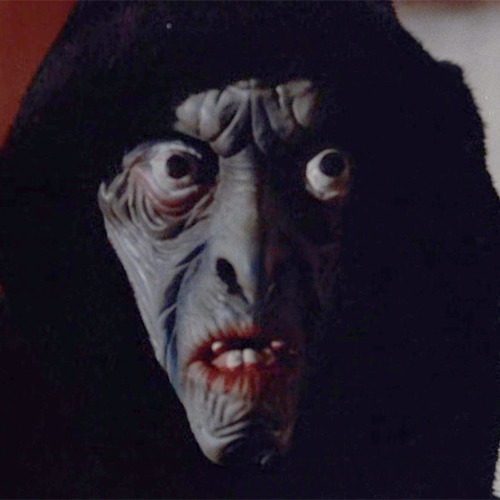
Communion (1989)
Director: Philippe Mora
Writers: Whitley Strieber
Stars: Christopher Walken, Lindsay Crouse, Frances Sternhagen
IMDB Rating: 5.5/10 Stars
Rotten Tomatoes Audience Score: 46%
The 1989 film "Communion" unfolds as nightmare fuel. Based on Whitley Strieber's autobiographical account, played by Christopher Walken, of a series of real-life Alien abductions from a race of Aliens called “the GREYS.” The film explores his unsettling experiences, blurring the lines between reality and imagination. As Strieber (Walken) and his family confront the mysterious events and beings, the intricate dance with the unknown, a shadow, movement behind a door. Only a crack open. Nothing could possibly hide around the small of a crack of space. You look harder, your vision adjusts to the dark. Then you see it. A large black almond-shaped eye with no pupil, just staring at you, coldly. It’s both there and not there at the same time. You see the door creak open and then you wake up in your bed, believing it to be a dream. OR WAS IT?
The beings are not products of imagination; they are manifestations of existential terror. Short in stature, yet towering in malevolence, their featureless bodies and colossal, almond-shaped jet black eyes become conduits for an insidious force that defies comprehension to all that bear witness. Their presence is an intrusion into the sanctity of our psyche, a violation of the comfort derived from the familiar. The false and disjointed realities projected onto us by them makes us feel like we are watching ourselves perform in a film where we try to speak to ourselves to get out of there, but the us in the movie cannot hear us as we become a voyeuristic explorer of scenes that straddle the boundaries between sanity, insanity and stone cold terror. Love and familial ties dissolve into the pool of nightmarish aberrations, and reality itself becomes a will-less substance manipulated by unseen hands. The film skillfully crafts an unsettling tone that taps into the primal fear of being abducted by “the GREYS.” – They have haunted us for sixty years, perhaps longer, we just cannot remember it.
The ability to evoke sheer terror without relying heavily on explicit visuals of the alien beings capitalizes on the power of suggestion and atmospheric tension, causing a lingering anxiety that transcends mere jump scares. Apply this logic to a ten or eleven-year-old. Damn right, I was scare as hell when I saw this. The scenes depicting Strieber's abduction experiences are a masterclass in psychological horror for any era, plunging us into the depths of existential dread. The film doesn't merely depict the physical aspects of abduction; it digs into the psychological trauma and the unsettling unknowns that characterize such experiences. For those fascinated by the enigma of alien abduction, "Communion" remains a standout choice. Its ability to induce genuine unease, coupled with a haunting portrayal of the psychological toll of otherworldly encounters, makes it a fun and exciting watch if you like to be freaked out while you watch movies.
Abduction can induce terror through the invasion of personal space, loss of control, and the unknown. “The GREYS” mysterious presence creates an unsettling atmosphere, leaving most in constant fear and uncertainty. The heightening anxiety through psychological manipulation and the violation of domestic sanctity. The terror stems from the inability to comprehend “the GREYS” motives, leaving victims vulnerable to an enigmatic and menacing force beyond human understanding. 2013’s “Dark Skies” and 1993s “Fire in the Sky” get notable mentions for their tone and depiction of terrifying Aliens abduction sequences.
The Fourth Kind (2009)
Director: Olatunde Osunsanmi
Writers: Olatunde Osunsanmi, Terry Robbins
Stars: Milla Jovovich, Will Patton, Hakeem Kae-Kazim
IMDB Rating: 5.9/10 Stars
Rotten Tomatoes Audience Score: 41%
"The Fourth Kind" was presented as a "re-enactment" of real events rather than a fictional narrative. The marketing campaign aimed to blur the lines between fiction and reality, creating a sense of mystery and intrigue around the movie. I fell for the trap myself. However, the “real events” that the film claims to make are a series of unrelated, other, random stories from all over the United States. The film was presented in a pseudo-documentary style, with reenactments of supposed “real events” mixed with both re-created footage based on the “real events” and actual "archival footage," along with interviews with the alleged “real-life people” this happened to. This approach was intended to make us question the authenticity of the story as it flips back and forth to the “re-enactment,” movie footage and the “archival footage.” Where the “archival footage” is also footage created for the film’s presentation to appear “based on actual events.”
This strategy received heavy criticism for potentially misleading people and exploiting the idea of real-life trauma for entertainment purposes. There were a lot of people online as well that felt cheated after discovering that the entire film was a work of fiction. An inside joke from producers to movie fans. The reality is people do "disappear" in and around the area of Nome, Alaska. They have a high rate of alcohol abuse among the locals, statistically. As isolated as this location is, it wouldn’t be out of the norm to wander off, nothing but the vastness of wilderness and not return. Exposure in the winter, bears in the summer... Man is not dominant here, even with our technology. It is a dangerous place to live. Make no mistake. Now ad hallucinational-alcoholism on top of that and I am sure you will find reports of people seeing Santa’s sleigh…
With all that said…
This movie still has some good total freak out moments in it. The aliens here are completely shrouded in Ancient Alien mystery. They are complete unknowns but command so much raw horror. So extremely terrifying, the ones that have seen them with their own eyes go insane if they saw “them” and remembered that they did. The fear of the subconscious and the unknown traumas that might lurk in one's mind. Combined with the dread “they” evoke to everyone that comes into contact with them. To know your eyes have seen something, but the memory cannot pull the image, and still the mere thought of it shows the body still remembers. It has not forgotten that anxiety, that fear, that horror. Go back and watch how the abductees start to act once they know they have seen “them” and they cannot remember but their anxiety immediately rises.
One of the Better Examples is the Owl.
The abductees didn't remember being abducted, but the owl evoked unspeakable terror in them. Like brainwashing or being tortured. A great example of what PTSD (Post Traumatic Stress Disorder) actually is. Those scenes, in particular, evoked the worst kind of dread in me. I still feel my neck prickle in those sequences. The tension never lets up once all the characters understand what it is that is actually happening. Where Abbey (Milla Jovovich) discovers something terrifying has happened to her on the audio recorder she had turned on for dictation as she was being abducted by aliens and couldn’t remember it. That whole scene is freaky and really stood out to me with unease. The idea that she was abducted by aliens but cannot remember the experience. We hear what happened on the recording, every sound and it creates a chilling sense of vulnerability, terror and powerlessness.
This is the only modern-day film that is represented here. Remember this is a list of things that terrified me in Film/TV, mostly things that have stayed with me from when I see them as a child through the lens of a child. Most of these feelings are from me trying to retrospectively make sense of what I saw, how I felt and how I feel now.
The Entity (1982)
Director: Sidney J. Furie
Writer: Frank De Felitta
Stars: Barbara Hershey, Ron Silver, David Labiosa
IMDB Rating: 6.7/10 Stars
Rotten Tomatoes Audience Score: 41%
The movie fictionalizes the real-life case of Doris Bither (Barbara Hershey), who claimed to be attacked and raped by invisible entities. Parapsychologists from UCLA observed the paranormal events and agreed to study the case. The film follows the fictionalized account of these events, incorporating supernatural horror and pseudoscience elements. The potential motivations of these entities, including feeding on human energy for survival using sexual assault as their weapon of choice. The invisible and unknown nature of the entity, the disturbing themes of sexual assault, the blending of supernatural and pseudoscientific elements, the relentless attacks, the emotional impact. Pretty much every rape scene in the film is horrific and painful to watch. From a special effects point of view it is absolutely brilliant for 1982. I mean seeing this as a young child and not really understanding the context of sex and there not be a man on a woman, but thin air on a woman just freaked me out from the time I saw the film as a child to an adult in film school. This movie still gives me ideas about what ghosts are and/or actually could be. I have a whole blog exploring the intersection of physics, consciousness, and the supernatural, into the idea that ghosts may be entities with measurable mass or formless energies that have consciousness. Drawing on concepts like Sacred Geometry and Quantum Mechanics. Considering the possibility of consciousness existing independently of organic matter. It connects various cultural representations of entities, from demons to energy vampires, and poses intriguing questions about the nature of consciousness, existence, and the mysteries within the UNIVERSE…
Kummituksia (Finnish word for Ghost)
Prince of Darkness (1987)
Written/Directed: John Carpenter
Stars: Donald Pleasence, Lisa Blount, Jameson Parker
IMDB Rating: 6.7/10 Stars
Rotten Tomatoes Audience Score: 61%
"Prince of Darkness," directed by John Carpenter in 1987, centers on a group of scientists investigating a mysterious cylinder filled with a pulsating, green liquid discovered in an abandoned church. As they study the liquid, they uncover disturbing revelations about its extraterrestrial origin and its connection to an ancient evil force that transcends time, space and reality as we now it. The liquid is revealed to be a form of concentrated anti-particles, a sentient embodiment of evil that was the inspiration of what the Christian church describes as Satan himself, seeking to escape from its otherworldly dimension of the anti-Universe. As the liquid turns their co-workers into zombies, the remaining members realize they have released the most unspeakable horror of them all. As the scientists delve deeper into the secrets of the malevolent substance, they confront increasingly terrifying phenomena, including disturbing dreams that blur the lines between reality and nightmare. The film explores the psychological and spiritual toll on the characters as they grapple with the horrifying implications of their discoveries. As the boundary between dimensions weakens, the group faces an escalating sense of dread and despair. The film's horror lies not only in the tangible threats posed by possessed individuals but also in the intangible, existential terror of an ancient, incomprehensible evil permeating the fabric of reality.
The concept of the "Anti-God" is explored within this mysterious cylinder filled with green liquid. As the liquid is studied by the group, they uncover ancient texts and prophecies that suggest the existence of an entity referred to as the "Anti-God." The green liquid is revealed to be a physical manifestation of this “Anti-God” in this Universe. This “Anti-God” is portrayed as a malevolent, primordial entity with the potential to bring about apocalyptic consequences with existential fear and terror of facing an ancient, incomprehensible evil. The concept plays on the clash between the divine and the diabolical, introducing a force that stands in direct opposition to conventional notions of goodness and order. That we never know what this energy actually is, but it can only be described in Christian terms of “Satan’s Father” or the “Anti-God.”
The dream sequences involving a shaky cam and white noise broadcasts from the future, featuring a demon-shaped creature emerging from the old Church and then later when Catherine (Lisa Blount) emerges from the old Church, used to give me nightmares for years, every few years all through my youth through college. For the viewer, this dream serves as a premonition, a foreboding glimpse into the impending terror to be bestowed onto the Earth in the fictional year of 1999 being broadcasted to the year 1987. The vagueness and distorted presentation of the demon/Catherine contributed to this lingering anxiety.
Lastly; in an earlier scene, Catherine and Walter (Dennis Dun) engage in a conversation about Schrödinger's cat while walking together on campus. Interestingly, as the plot unfolds, Catherine makes a sacrificial act towards the end of the film, ultimately finding herself trapped in the anti-Universe behind the mirror. One could argue that, within the movie's context, she becomes a tangible manifestation of the Schrödinger's cat thought experiment. In this analogy, her state in Limbo is in parallel to being inside a box or container, and her life or death remains uncertain until someone opens the "box" and observes her. Reopening the pathway between Universes. Existentially, this has always terrified me about this movie and movies like it. I am sure there are more buried in my subconscious but these movies still have things and concepts that still stand out to me after all these years.
Galaxy of Terror (1981)
Director: Bruce D. Clark
Writers: Marc Siegler, Bruce D. Clark, William Stout
Stars: Edward Albert, Erin Moran, Ray Walston,
Sid Haig, Robert England, Grace Zabriskie
IMDB Rating: 5.0/10 Stars
Rotten Tomatoes Audience Score: 28%
1981’s "Galaxy of Terror" could be said to be one of the worse movies ever made. It should be on that list. The effects from the film are either borrowed from other films or were used in other similar movies that deal with the same themes. I can distinctly remember seeing the same exact effects and ship models in other movies over the years. As bad as this movie is it did hold some existential horror through two disturbing scenes I saw when I was about two or three-years-old, that contributed to my psychological and physical fears and night-terrors.
The first scene involves the rape of Dameia (Taaffe O'Connell), by a giant space worm. This disturbing act not only portrays a violation of the character, but also taps into her previously established fear and aversion to maggots and worms. The grotesque encounter serves as a metaphorical manifestation of her deepest anxieties, merging physical and psychological terror. She literally dies from the giant space worm raping her violently to an orgasm that is so intense she has a heart attack. What they couldn't show in the movie due to the extensive graphic nature and sexual violence in this scene, was the worm's orgasm into her. I know this is gross, horrid and disgusting, but supposedly it was filling her up with so much, so quickly, that her body died from shock. Right up till the end of the scene; which is the worm still raping her as she dies. The scene ends with the last thrust of the worm into her. The scene had to be toned down for many reasons. The MPAA had threatened an X rating, which in the 80s was a death sentence to a film making any sort of money whatsoever. Taafee herself did not want to do full nudity, which is one of the reasons she is rolled over on her side when the rest of the crew find her body.
The second scene intensifies the existential horror by exploiting claustrophobia. Alluma (Erin Moran), faces a nightmarish demise as she navigates tight spaces. Her character, previously established as having high anxiety when confined, experiences a gruesome end as cables squeeze her, culminating in the grotesque explosion of her head, that is considered classic in the cosmic horror subgenre. This scene capitalizes on the primal fear of confinement and the dread associated with the frailty of the human body. Both scenes play on the characters' individual fears, transforming them into harrowing physical ordeals. From the context of a child with no frame of reference other than the screams of terror. As I look back at my very young viewing experiences in Film/TV; I laugh at some of these movies for how bad they are and funny they can be, but as a child with no context, yeah, scary as fuck.
Fear becomes a visceral response to the uncertainties of life, serving as a constant reminder of mortality. It is not merely an emotion, but a dynamic force that influences both our conscious and subconscious minds. Our dreams and nightmares distort the perception of time, and challenges conceptions of self. The psychological impact of fear is a storm of strong feelings that create illusions and blur the boundaries of safety. Fear is a mysterious and elusive force. The terror of the unknown and the feeling of a harmful force in one's personal space. Fear emerges as a multifaceted phenomenon, intertwining with existential questions, psychological intricacies, and cinematic experiences. It transcends the boundaries of mere emotion, becoming a force that shapes our understanding of existence. The unsettling nature of fear as both a universal phenomenon and an intimate, personal encounter with the UNKNOWN. The passing of fear leaves us contemplating the profound implications on the philosophical stage of human existence, where the line between reality and imagination becomes blurred, much like the elusive nature of fear itself.
Themes of existential terror, unknown entities, psychological manipulation, and the blurring of reality and imagination are recurrent from the haunting beauty within the deformity of "The Elephant Man," Jason from "Friday the 13th Part 2" to the unsettling uncertainty of extraterrestrial existence in "The Fourth Kind," and "The THING." Just a glimpse of a mask in "Tightrope," each movie becomes a vessel for exploring the depths of fear and the unknown. The thematic threads of existential dread, societal judgment, and the clash between reality and imagination weave through these instances of child-like terror, creating a tapestry of personal fears and cinematic brilliance. The exploration of psychological horror in "Communion" and "The ENTITY." The cosmic terror in "Prince of Darkness," "Altered States," and "Galaxy of Terror" showcases the enduring power of these films to induce genuine unease. These instances of sheer existential terror from my youth remain etched in my memory, lingering in my subconscious long after the credits have rolled and are still rolling.
amplectere palloris
Latin for (Dread's Embrace)
By David-Angelo Mineo
11/19/2023
5,196 Words
#horror#slasher#horrormovies#horrorfan#slashermovies#slasherfilm#horrorjunkie#horrormovie#80shorror#horrornerd#fridaythe13th#jasonvoorhees#horroraddict#slashermovie#horrorfanatic#horrorgeek#instahorror#scary#horrorlover#writersnetwork#writer#writersofinstagram#writersofig#writers#blogger#bloggers#bloggerstyle#bloggerlife#godblogger#bloggerslife
0 notes
Text
I’m both devastated and grateful that I went through life-altering personal trauma during these last years that have been and still are excruciating for everyone. I’ve been trying to make my own sense about what is “changing” in America (rather, crescendoing - it’s all the next development stage of centuries of the same evil and social sickness), and maybe this is just something everyone eventually realizes, but I can’t stop seeing the scaled-down versions of these awful power struggles and strategies play out in the immediate world I see around me, and in my life. The same low hum of menace we all feel in our world now (though many heard it long before) I recognize, just in a higher octave, in the ways people have hurt me and in my own fears and uncertainty. When my past relationship ended and the love of my life left me for good after what was a truly personality-altering experience in our last try at a relationship, my fundamental understanding of how the world works and what I thought my life would be radically and rapidly changed. I never actually understood PTSD until I was diagnosed, which is sort of a no-brainer, but I just wasn’t expecting that an experience could actually make the world feel totally alien to me. To this day when I’m pondering the world and myself as I see them now, I’m still often surprised at how it feels like I accidentally slipped through to a mirror dimension where everything feels just *wrong*, like if I could just find a witch to help me break the curse, I’ll wake up back in the timeline I was meant to be in, as the person I was before, with the person I love and in a world that while hard and painful, doesn’t feel like I’m in the Other Mother’s world from Coraline. Intellectually I know that the past will never change, and that so much time has passed, my ex must be such a different person too, and I know that I must stay the course of moving (and I will, and I have hope that one day it won’t hurt anymore).
But the hardest part is the way I see the world now. I don’t know how someone people can be hurt so many times and still trust, still open their hearts. But with this, and facing it all while the world threatens to entirely destroy itself, I feel more isolated and alone than ever. I feel others feeling it to - the ones with loving partners, lots of stability in the home and work life, and strong innate abilities to feel loved by and connected to others, however, I know are doing better than the rest of us. It’s one of the most tragic realizations I’ve had - that power accrues power, the lack of it leads to more lack of it. Even with the benevolent and good power of love and connection: the less you have of it - the more difficult it is to enjoy it with others or even find others to share in it - the more likely it is to lose what you already have. But what all of this rambling (I’m so sorry - I can’t tease out the most sensible way to connect all of my points when I’m tired, which seems the only time I write anything in) is getting at is that this chronic loneliness I think leads naturally to lack of connection - one of the most aggressive infections that keeps wounds from healing (regardless of what caused the wound), on the personal and the social strata. Loneliness is like sugar feeding the bacteria of individualism… when you start to internalize that your best efforts (usually inadequate when hindered by the forces of exhaustion, poverty, mental illness, or powerful habits/loss of social skills formed by self-isolation in a pandemic or the loss of social skills) aren’t enough to make and sustain the connections that abate loneliness (and I don’t mean just romantically), you internalize that you are fated to do this alone. It robs you of your ability to identify with others - I don’t know how to explain this honestly, but I see it in so many people, including myself, and especially in the loneliest people I know. Reciprocity begins to feel like a myth, whether your self-narrative is that you don’t deserve it or people are inherently selfish and won’t give it to you, or both. The idea of people being capable of and wanting to connect with you, and you being capable of and wanting to connect with them, feels like a strange and distant dream. You become not a part of the world but something placed in or upon it. It’s the individual case of a much larger pattern that stacks and feeds back into itself and creates the battlefield that is the hyperindividualism of white, capitalist culture. The normalized sadism, the treatment of everyone from employees to even our most intimate loved ones as resources that must be cut off and ditched the moment they “underperform”, and the replacement person substituted in with almost no glances back at the people we replaced like commodities - some walking away with lessons, but in so many ways and after so many times (and I mean this far more in the context of workers in capitalism) typically stacked behind us in landfills.
It’s something that I’ve found to be helpful for coping in hard moments (especially at night when I have the fewest distractions and most time to ruminate) when I remind myself that I cannot, I must not, resign myself to the hopelessness that I will feel this alone always. My self-worth is still so low after a lifetime of negative experiences and poor mental health, but I’ve still been set back so many years even after a couple of years of recent healing. But I know if I subscribe to this worldview of an inherently unkind, “dog-eat-dog” world that will always leave me alone, that will always result in being left the ways in which I have been left before, I will cut off that feeling part of me, the part that connects me to humanity as a whole. I would simply rather not live than mutate into someone who becomes a perfect bullet for the arms pointed against the hope of a future for this world. If I really want to help fight for the world in which we survive this and maybe even come through knowing better and doing better, I have to keep fighting to keep myself whole. Internalizing that there is no hope for me to feel and give love again the way I can feel and give love so brilliantly, with my reckless, grinning, soft heart held in my open hands, would create those same patterns in my actions on the larger scale. Because these things scale up or down in perfect fractals - if I believe there is no love and trust to find around me, I will inevitably believe there is none to find *all* around me.
Despite the narrative the trauma keeps telling me, to protect me in a misguided way, one of my strongest traits is my big love. I just need to remind myself that despite what happened in the past, there are people even now waiting and wanting to hold that love safely, to value it, who want to give love back because they know their love is safe with me, too. My friends and family are just waiting for me to put down my shield and let myself be loved.
0 notes
Text
Jumping off @kidrat ’s recent post on JKR, British transphobia, and transphobia against transmasculine people, after getting a bit carried away and too long to add as a comment:
A major, relatively undiscussed event in JKR’s descent into full terfery was this tweet:
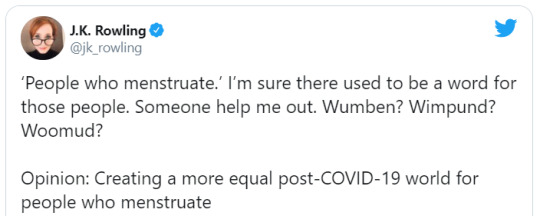
[image id: a screenshot of a tweet from JK Rowling reading: “’People who menstruate.’ I’m sure there used to be a word for those people. Someone help me out. Wumben? Wimpund? Woomud?”
Rowling attaches a link to an article titled: “Opinion: Creating a more equal post-COVID-19 world for people who menstruate” /end id]
This can seem like a pretty mundane TERF talking point, just quibbling over language for the sake of it, but I think it’s worth discussing, especially in combination with the idea that cis women like JKR see transmasculine transition as a threat to their womanhood. (Recite it with horror: ”If I were young now, I might’ve transitioned...”)
A lot of people, pro- or anti-transphobe, will make this discussion about whether the term “woman” should include trans women or not, and how cis women are hostile to the inclusion of trans women. And that’s absolutely true. But the actual language cis women target is very frequently being changed for the benefit of trans men, not trans women, and most of them know this.
Cis people are used to having their identities constantly reaffirmed and grounded in their bodies. A lot of cis women, specifically, understand their social and physical identities as women as being defined by pain: misogynistic oppression is equated to the pains of menstruation or childbirth, and both are seen as the domain of cis women. They’re something cis women can bond over and build a “sisterhood” around, and the more socially aware among them can recognise that cis women’s pain being taken less seriously by medicine is not unrelated to their oppression. However, in the absence of any trans perspectives, these conversations can also easily become very territorial and very bioessentialist.
Therefore... for many cis women, seeing “female bodies” described in gender neutral language feels like stripping their pain of its meaning, and they can become very defensive and angry.
And the consequences for transmasculine people can be extremely dangerous.
Not only do transmasculine people have an equal right to cis women to define our bodies as our own... Using inclusive language in healthcare is about more than just emotional validation.
The status quo in healthcare is already non-inclusive. When seeking medical help, trans people can expect to be misgendered and to have to explain how our bodies work to the doctors. We risk harassment, pressure to detransition, pressure to sterilise ourselves, or just being outright turned away. And the conversation around pregnancy and abortion in particular is heaving with cisnormativity - both feminist and anti-feminist cis women constantly talk about pregnancy as a quintessentially female experience which men could never understand.
Using gender-neutral language is the most basic step possible to try and make transmasculine people safer in healthcare, by removing the idea that these are “women’s spaces”, that men needing these services is impossible, and that safety depends on ideas like “we’re all women here”. Not institutionally subjecting us to misgendering and removing the excuse to outright deny us treatment is, again, one of the most basic steps that can be taken. It doesn’t mean we’re allowed comfort, dignity or full autonomy, just that one major threat is being addressed. The backlash against this from cis women is defending their poorly developed senses of self... at the cost of most basic dignity and safety for transmasculine people.
Ironically, though transphobic cis women feel like decoupling “women’s experiences” from womanhood is decoupling them from gendered oppression, transmasculine people experience even more marginalisation than cis women. Our rates of suicide and assault are even higher. Our health is even less researched than cis women’s. Our bodies are even more strictly controlled. Cis women wanting to define our bodies on their terms is a significant part of that. They hold the things we need hostage as “women’s rights”, “women’s health”, “women’s discussions” and “support for violence against women”, and demand we (re-)closet ourselves or lose all of their solidarity.
Fundamentally, the problem is that transphobic cis women are possessive over their experiences and anyone who shares them. Because of their binary understanding of gender, they’re uncomfortable with another group sharing many of their experiences but defining themselves differently. They’re uncomfortable with transmasculine people identifying “with the enemy” instead of “with their sisters”, and they’re even more uncomfortable with the idea that there are men in the world who they oppress, and not the other way around. “Oppression is for women; you can’t call yourself a man and still claim women’s experiences. Pregnancy is for women; if you want to be a man so badly why haven’t already you done something about having a woman’s body? How dare you abandon the sisterhood while inhabiting one of our bodies?”
Which brings me back to the TERF line about how “If I were young now, I might have transitioned.”
I’m not saying Rowling doesn’t actually feel any personal connection to that narrative - but it is a standard line, and it’s standard for a reason. Transphobic cis women really believe that there is nothing trans men go through that cis women don’t. They equate our dysphoria to internalised misogyny, eating disorders, sexual abuse or other things they see as “female trauma”. They equate our desire to transition to a desire to escape. They want to “help us accept ourselves” and “save us” from threats to their sense of identity. The fact is, this is all projection. They refuse to consider that we really have a different internal experience from them.
There’s also a marked tendency among less overtly transphobic cis women, even self-proclaimed trans allies, to make transphobia towards trans men about cis women.
Violence against trans men is chronically misreported and redefined as “violence against women”. In activist spaces, we’re frequently told that any trauma we have with misogyny is “misdirected” and therefore “not really about us”. If we were women, we would’ve been “experiencing misogyny”, but men can’t do that, so we should shut up and stop “talking over women”. (Despite the surface difference of whether they claim to affirm our gender, this is extremely similar to how TERFs tell us that everything we experience is “just misogyny”, but that transmasculine identity is a delusion that strips us of the ability to understand gender or the right to talk about it.)
I have personally witnessed an actual N*zi writing an article about how trans men are “destroying the white race” by transitioning and therefore becoming unfit to carry children, and because the N*zi had misgendered trans men in his article, every response I saw to it was about “men controlling women’s bodies”.
All a transphobe has to do is misgender us, and the conversation about our own oppression is once again about someone else.
Transphobes will misgender us as a form of violence, and cis feminist “allies” will perpetuate our misgendering for rhetorical convenience. Yes, there is room to analyse how trans men are treated by people who see us as women - but applying a simple “men oppressing women” dynamic that erases our maleness while refusing to even name transphobia or cissexism is not that. Trans men’s oppression is not identical to cis women’s, and forcing us to articulate it in ways that would include cis women in it means we cannot discuss the differences.
It may seem like I’ve strayed a long way from the original topic, and I kind of have, but the central reason for all of these things is the same:
Trans men challenge cis women’s self-concept. We force them to actually consider what manhood and womanhood are and to re-analyse their relationship to oppression, beyond a simple binary patriarchy.
TERFs will tell you themselves that the acknowledgement of trans people, including trans men, is an “existential threat” that is “erasing womanhood” - not just our own, but cis women’s too. They hate the idea that biology doesn’t determine gender, and that gender does not have a strict binary relationship to oppression. They’re resentful of the idea that they could just “become men”, threatened by the assertion that doing so is not an escape, and completely indignant at the idea that their cis womanhood could give them any kind of power. They are, fundamentally, desperate not to have to face the questions we force them to consider, so they erase us, deflect from us, and talk over us at every opportunity.
Trans men are constantly redefined against our wills for the benefit of cis womanhood.
TL;DR:
Cis women find transmasculine identity threatening, because we share experiences that they see as foundational to their womanhood
The fact that transphobes target inclusive language in healthcare specifically is not a mistake - They do not want us to be able to transition safely
Cis women are uncomfortable acknowledging transphobia, so they make discussion of trans men’s oppression about “womanhood” instead
This can manifest as fully denying that trans men experience our own oppression, or as pretending trans men’s experiences are identical to cis women’s in every way
#transphobia#transmasculinity#transandrophobia#this could maybe do with one more proofread but i've spent way too long on this so whatever!
780 notes
·
View notes
Text
I see some folks getting upset about people who are convinced Travis's characters are going to keep rotating/Chetney can't be his real character etc. and I'm gently perplexed by the bad faith take that engaging with the possible mystery precludes the idea that temporary characters could have anything of value to bring to the story.
I like to play with the idea that Travis isn't done rotating characters because I'm thrilled to see how each one will bring a different dynamic to the gang as they find themselves. I'm fascinated by the effect that sort of switching can have on the sense of identity of a dnd group - what does it look like to get comfortable with transient friends and help? What does it hurt? What does it strengthen? What does it reveal about the group and the individuals within it? It's not quite like guest appearances were in c2, where even the characters knew they were aligning for just a short while. There's no reason Keg wouldn't have been adopted into the Nein in any other format, but since the meta declared she would be temporary the whole vibe was as such. So too with every other guest, because that's how it works.
It's not the same with Travis's characters. All of us and the group were surprised when Bertrand was removed from the equation and it came with some good character moments and a little more groundwork laid. It wasn't cheap - Travis was in on it with Matt! The trust that goes into that kind of setup is remarkable.
So now we have Chetney, who brings a whole other vibe and skillset to the group and who seems to be settling in with the group, namely backing off Dorian and pursuing a meaningful connection there even as he accepts he could be one of them. A heartfelt conversation had between two characters who could go at any moment because the narrative calls for it and not the same way the loss of one of our presumed permanent characters (and they are presumed) would potentially disrupt things.
Or would they? I mean we've been operating under the assumption that six are permanent and two aren't. But what if Dorian leaves with the other two from the exu crew? What if Laudna and Imogen find the answers they're looking for and say farewell? I'm not taking Travis's characters as a joke or cannon fodder. I am looking at the way repetitive loss can fundamentally alter the way we engage with a group setting and already, it would not hit the same if someone were to go down the way Molly did. We are starting on a basis of change. We are disrupting preconceived notions of how this game works from the word go, only this time there's an element of both control and chaos. The players trust Matt and we may not fully know what they've planned with him.
It's not a refusal to engage with characters where they are. It's a study of how the group dynamic changes and shifts with the deliberate narrative randomness and reasonably wondering what's next. Maybe Chetney stays. I think it would be great to have him. Maybe he goes, and maybe so do a few more before things settle.
Or maybe they don't settle at all and that's the point.
If Chetney is a joke character then Travis is in on it and that's fine and it opens up fun possibilities that might be OP or just plain unwieldy on a permanent pc. If he's here to stay, then we've got a solid foundation building around him getting attached to Dorian and the group.
I just wouldn't bet on stability, and the reasoning for that was given to us by a player and the DM himself, not to mention Marisha's iconic words: all bets are off, bro. I don't exactly feel like anyone's doing a disservice to the show by interpreting and incorporating something explicitly planned and the promise of more to come.
#(so chill out about people having fun with the possibilities)#CR spoilers#CR c3#Spoilers just because I mentioned Chetney buddying up to Dorian#This being said I do kinda feel bad for people who are looking for meta and love about him specifically and only finding conspiracies#That's got to be frustrating and a good reason for me to work on getting some stuff to contribute about Chetney himself#I mean I have so many questions about him
51 notes
·
View notes
Text
Her Second Return
Just like all of you, and especially my fellow Penny fans, I am absolutely devastated by the Volume 8 finale. I had been in quite a state these last few days, utterly heartbroken, and actually nauseous at times. It feels strange to me to be legitimately grieving a fictional character, but it’s not a bad thing to feel this way. To me, this just shows that CRWBY loves her just as much as us to have written her so well that we connect so completely with her, that it feels like we lost an actual piece of ourselves when she’s gone.
But as you can probably tell by the title, this mega post isn’t gonna be about accepting this end, not in the slightest! Today I want to share canon evidence that can point towards another return of our beloved quirky red headed cinnamon bun! I’m here to spread this hope that I and others in the Nuts & Dolts dolts Discord server have!
I have this separated into many different sections to keep these thoughts organized. With that said, here goes…
A Father’s Words:
In Episode 7 of Volume 7, ‘Worst Case Scenario’ we learn the origins of Penny’s aura, and thus her soul. We also learn that it takes more aura each time she’s brought back. This leaves open an option that could be used at a later point.
Many people theorized that Pietro could indeed revive Penny one more time, which he would absolutely do. But there also lies the possibility that someone else could donate some of theirs, I’m not sure about this as I feel like it’s akin to blood donation where compatibility matters or there's a high risk of altering her, but the possibility is definitely there.
Now, the conversation in Chapter 5 of Volume 8, ‘Amity’ that Pietro and Penny have is an important moment for both Father and Daughter. It was there to show how her death in PvP all that time ago really did have a heavy impact on him and is still affecting him to this day.
Instead of continuing to pretend that everything is A-okay, like he had done for most of Volume 7, he finally lets his true feelings about how it come out to Penny for what is quite likely the first time. Even going so far as to say "Are you asking me to go through that again?" when she offers to take the risk of trying to lift Amity with her power. He wants Penny to be able to live her life.

This entire scene with Pietro established “this is what will likely happen” even if circumstances are much different now, it doesn’t negate the fact that this is a key part of Penny’s story. Scenes like these have a purpose beyond simply making an eventual death all the more heart wrenching. Her never actually getting to live her life makes those scenes basically moot. It makes them effectively pointless from narrative point of view. Unless there's more to it.
Building Relationship:
The build up between Ruby and Penny the last two volumes has been absolutely phenomenal with a definite destination in mind, and this doesn’t feel like that destination. So much of the arc of this season was to help Penny. This girl that our main protagonist absolutely adores and treasures, it would just be awful to throw all of that out for what amounts to an avoidable end. Why use so much of their precious and very limited runtime on deliberately building up this relationship only to end it abruptly, and permanently, when they’re separated?
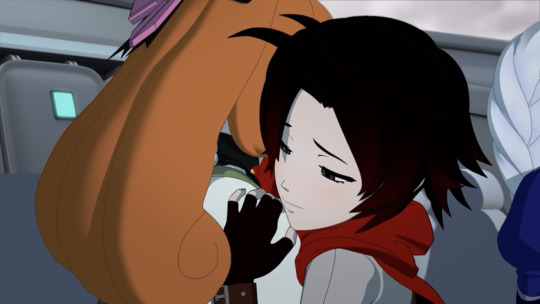
In my opinion, RT is definitely smarter now than to intentionally set up what was really looking like a budding gay relationship only to kill one of them for good. If N&D wasn't actually going in a romantic direction, why would they leave in all of the romance-adjacent stuff that they got, that's not how ‘just friends’ act. And that is not something you use such valuable time building up for absolutely no pay off whatsoever...
Representation of Hope:
At its core, RWBY has always been about hope. It’s not at the forefront the whole time, but there's been an underlying theme of hopefulness that has persisted since it began. Some describe the show as a Hopepunk, I personally find this to describe RWBY really well. This genre of storytelling is about caring for things deeply and the courage and strength it takes to do so. It’s about never submitting or accepting the way things are. Fighting for what you believe in and standing up for others. RWBY fits all of this extremely well. How does this relate to Penny? She has been shown to be a sign of hope for everyone, but especially for Ruby, the main main protagonist. A prerequisite for a Hopepunk story is the hope.
Her first death in V3 was something that fundamentally changed Ruby. For the first time in the series, we see our main character all but broken by this event. With the loss of Penny, immediately afterwards, Ruby’s hope followed. She made up for it through determination and force of will. We see it affect her multiple times throughout the journey to Volume 7. But upon her return in V7, Hope reached a high point for everyone, the sheer relief on Ruby’s face is plain to see!
In V8 chapter 5 ‘Amity’, Penny literally raises hope by lifting the arena into the sky so Ruby could spread her message. And when she falls, and Amity with her, the connection is lost and hope plummets again. From there things take a very negative turn with the hack begins to take Penny’s agency.
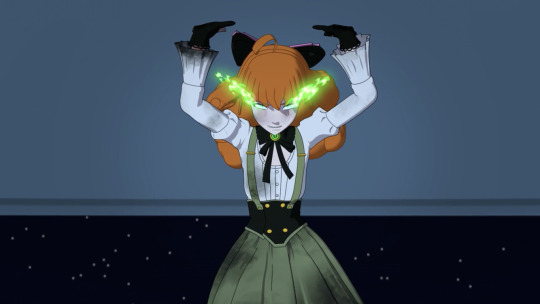
In chapter 11 ’Risk’ is the point in the arc where everyone is reunited for the moment, so two separate hero stories are no longer a thing at that point in time. For the time being focus seemed to be shifted to care about the characters and how they’re going to solve the current problems. This is also where Ruby reaches her lowest emotional point in the season.
It’s not huge, but it’s interesting how connected this is. Before Ruby and Yang share a good cry over learning the possible fate of Summer, Yang brings up restoring optimism and hope to Ruby after the younger sister storms out of the room in frustration. This is where Penny’s scenes take up the rest of the episode. Getting Penny back in control of her own body and safe again is what makes the ending of the episode much brighter, when just 5 minutes before Ruby had been distraught and scared. This then spills over into the group coming up with the plan to use the staff, putting the main group in a much better mood. Of all the things to go right, it’s interesting that it’s Penny.
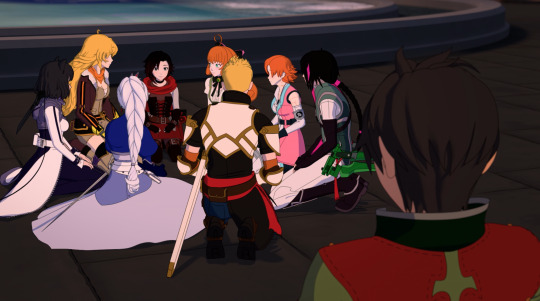
Things go wrong with the plan in the end and Penny dies. I find it interesting that once again, Penny got them hopeful in their chances of doing something right. Given said plan succeeded but at the cost of Penny of all people, Penny is shown to be the beginning and end of hope for them
The highest and lowest points for hope seem to directly correlate to when Penny’s around. When she comes back again, hope will return too, just like it had before. And because she’ll likely be back for good this time, the second return will probably be close to when Ruby is nearing the complete abandonment of hope. This would be pretty par for the course of the show honestly.
A little aside, but in a sense, Penny also represents Unity. The CCT in Vale fell after her first death, knocking out global communications and the unifying connection it gave. When it was restored for the briefest moment, she was there. Her body connected so she could allow for its launch, her soul lighting the night to hold up Amity with every ounce of her strength. So of course when the Hack succeeds and she falls, she takes global comms down again with her. At a smaller scale - even at the Hack's second last attempt to control her, she draws everyone in the Schnee Manor together. At the start of the volume, Yang states the one thing that they all agree on is not surrendering Penny.
Unity seems appropriate for one whose first song and wish was for but one friend, who would go on to find so many more in the process, and permit for a moment the possibility of all Remnant becoming friends once more. Where she first died, the name of the episode devoted to her story - Amity, "friendship", from the Latin root amicus, "friend" - she almost lives and dies with the very possibility of a united Remnant. It's no wonder she's a priority target for Salem, the great divider, and it seems natural that her next restoration may very well allow the next bid to bring the world together.
The Void Screams:
Moments after Penny's death, we hear a weird scream in the void space. It was a guttural, pained, angry scream, almost like the void space itself was crying out. All the portals shuddered and flickered when it happened.
Some think that this scream was Salem returning, but that happens earlier than Penny’s death, her return is signaled with cinder's arm acting up. We know this because after the arm finished flailing uncontrollably, Cinder said triumphantly "she's back." If it were Salem screaming, it would have happened after she fixed herself, but it didn't.
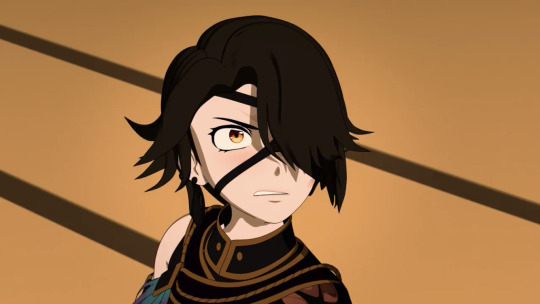
And I doubt Cinder would have been surprised or unsettled by it considering she was happy Salem returned not long before it. And why would a Salem scream affect the portals anyway, she has no connection to the staff or it's magic.
Another thing to consider is the fact sound is not transmitted through the portals. Otherwise, they would've heard Oscar and the rest calling for them, or the screams of the citizens of Mantle and Atlas. This lowers the possibility of that scream being from Salem even further.
The sound really seems to be coming from something else entirely within the void, and that something is not at all happy. There’s also the fact that Penny was the only person who died in the void space, everyone else was just thrown out of it like Ruby and Co. The only logical cause to me is Penny. Her body was a product (or byproduct) of the same creation magic that made the void space, her blood seems to have been a trigger.
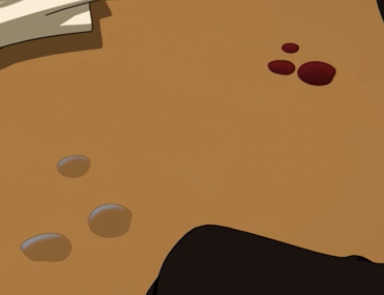
Now I can't be sure about it, but this makes me feel like Penny is almost a part of creation itself? For whatever this thing is to be so angry, that is the only explanation I can think of currently. But all of this could possibly relate to the Narnia allusion of 'the willing victim killed in a traitor's stead' that others have brought up, which will be covered next.
Narnia Parallels:
Atlas has several parallels and references to fictional places (putting aside real world ones like the United States). One of those is that of Narnia, both on the surface and on a deeper level. It is a land of winter year round, where people struggle to survive and there is a present divide between those loyal to the current Monarch and those who are not. James is a parallel to Jadis, the White Witch, a ruler whose thoughts and cares aren’t exactly centered around the actual well being of the people. The hologram table in Ironwood’s office is designed to look like stone, like the Stone Table which features prominently in the Lion, the Witch, and the Wardrobe. He has a handpicked cadre of special agents/secret police, like how Maugrim and his wolves served Jadis. Another key parallel is how Jadis’s winter sets in to oppress and kill everyone in Narnia, but the Witch provides aid and protection to her loyal followers. She has all the power to spare harm to others, and uses it only for the loyal. As soon as Mantle splits from James and Atlas, no care is taken to protect them from the cold of Solitas even though he has every ability to turn the heating grid back on. His protection is only for the loyal.
Now that the parallel is established, let's look into the details. Starting with how James plays the role of Jadis.
"I had forgotten that you are only a common boy. How should you understand reasons of State? You must learn, child, that what would be wrong for you or for any of the common people is not wrong in a great Queen such as I. The weight of the world is on our shoulders. We must be freed from all rules. Ours is a high and lonely destiny." These are the words Jadis says in the Magician’s Nephew to justify the blood civil war she and her sister had waged for rulership of Charn, before she came to Narnia. She won that war, technically, but only after the last battle had been lost and her sister had marched right up to her so that they were face to face. Jadis’s troops were dead, her followers had surrendered, and the capital was under full control of her sister. But, she still had one card, one ultimate play to win and prove the throne of Charn was rightfully her. The Deplorable Word, a piece of old magic that killed everyone and everything except for her on Charn. It was monstrous, senseless, cruel beyond measure. But it got her that hollow victory. This mindset, the disregard for the people except as tools for her own will, the ultimate ‘aoe’ destructive move that no one had even considered her using, the unwillingness to stop even when by all practical measures the war is over, is a shocking parallel to James. In many ways, he is Jadis in mindset and deed.
Then there is the shared desire for A Thing that both James and Jadis have. For James it’s the Winter Maiden and control over her. For Jadis it’s the Silver Apples from the Tree of Youth. And funnily enough, the Maiden Powers parallel the Apples quiet well. These apples grant power and a life of eternal beauty, but should not be taken or eaten on one’s own initiative. They must be given, a gift granted by another, or only suffering will come from obtaining them. "For the fruit always works — it must work — but it does not work happily for any who pluck it at their own will. If any Narnian, unbidden, had stolen an apple and planted it here to protect Narnia, it would have protected Narnia. But it would have done so by making Narnia into another strong and cruel empire like Charn, not the kindly land I mean it to be.” Jadis’s immortality, and some of her power, come from the fact that she ate an Apple of her own will after stealing her way into the garden where the Tree of Youth had been planted. She gained the eternal life she had wanted and the power along with it, but she did so by taking it and was cursed because of it. Her skin turned pale and her lips blackened as if she were a frozen corpse given life. She will be trapped in a life of misery and hate according to Aslan- oh hey Cinder, how’s having stolen the Power you always wanted working out for you? Cinder had the power she wanted, but she only got hungrier, eager to claim more and increase her might. But in her pursuit she was defeated and humiliated by Raven, had to steal her way out of Mistral, and then suffered defeat after defeat while in Atlas. Only in the end, when she didn’t keep pursuing the Maiden Power, did she get any kind of victory.
The reason these parallels to Narnia are so important is one of the most famous events of the series. The cracking of the Stone Table and the rebirth of Aslan after his death. ‘When a willing victim who had committed no treachery was killed in a traitor's stead, the Table would crack and Death itself would start working backward.’ Well, the ‘Stone Table’ in James’s office has cracked, and Penny strikes me as a pretty willing victim. She has never actually committed any actual treachery or harm, as she was the Protector of Mantle, and fought for its and Atlas’s people until the very end. And because of her death, the actual traitor, Winter, who loyally served James until he had gone too far, was saved. Through Penny’s self sacrifice, Winter was saved. So now Death itself will start working backward.
(Major props to my friend @catontheweb for writing this section, I was getting nowhere with it, if they weren't there this part wouldn't exist!)
Norse Mythology:
The tree we see in the post credit scene gives off some serious Yggdrasil vibes. Also called the World Tree, it is essentially all of creation in Norse Mythology. It connects all nine realms, including the God realms of Asgard, the human realm of Midgard, and the underworld of Hel.
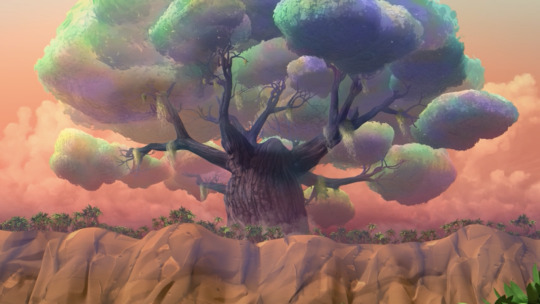
Humans are born from the branches of Yggdrasil. The web of Wyrd is woven for every person once they're born, and their path is set from there regardless of how many times the souls cycle over. But at the end, they're destined to end up in one of the worlds, for a myriad of reasons.
I believe Penny landed closest to this giant tree. She was on the center platform in the void space, so if that space is directly above the island(?) the tree is on, it makes sense for her to fall by the center nearest to the tree. This would not only open up all kinds of possibilities for the volume in general, but it would also create options for Penny.
The whole of Yggdrasil’s representations fit well into Penny’s story. Birth, growth, death and rebirth. We can count Penny’s appearance in V7 as birth for now, her growth is all her development in leaving =the military and becoming a Maiden, her death just happened, and her rebirth would be her revival. And this is a cycle she’s gone through before.
The Norse god Odin and Yggdrasil have quite a connection. In one story, Odin cut out one of his own eyes to gain knowledge from a pool underneath Yggdrasil. The only one that fell whose eyes alone are incredibly significant to the story was Ruby. So, they could choose to have her allude to Odin by having Ruby make some kind of deal with whatever entity likely rules over this magical place. An eye for Penny’s life.
There’s another story about Odin, Yggdrasil and the pursuit of knowledge. Odin so loved knowledge, that he sacrificed himself in a quest to learn the deeper magic of runes. It was believed one could only learn the magic spells from runes in death. So, Odin hung himself on Yggdrasil for nine days as an offering, and teetered between life and death. After he mastered the last spell on the ninth night, he ritually died and all light was extinguished from the world. Odin’s death lasted until midnight, when he was reborn and light returned to the world.
This story doesn’t fit Penny perfectly, but allusions often don’t. So If she really did land near the tree, she could be another loose representation of Odin’s story here. What she did wasn’t for knowledge, but to save her friends and keep Cinder from getting the Winter Maiden power. She believed it necessary that she sacrifice herself to achieve this end. As we established, Penny represents Hope, so her death means the loss of hope. This parallels Odin’s story of his death meaning the loss of light itself. So if this theory holds up, it would make this death temporary, until her rebirth and the return of Hope with her once again.
Alternatively, Ruby has the potential of loosely representing Odin in this story as well. Odin later uses the knowledge of the runes to do many things, but the most relevant one right now is awakening the dead. Both of these stories are about making a personal sacrifice to gain something that is desired. Ruby would absolutely make such sacrifices if it meant saving Penny.
It is said that Odin lived “according to his highest will unconditionally, accepting whatever hardships arise from that pursuit, and allowing nothing, not even death, to stand between him and the attainment of his goals." This sounds like Penny's arc of accepting the WM powers. This is more just a general connection between Penny and Odin, but I found it interesting.
Side Note: I encourage anyone who’s interested to look into RWBY connections to Norse Myth, there’s a surprising amount of things that feel eerily similar to the show. Likely just coincidental, but it’s fun to think about!
(If I got any of this wrong, I sincerely apologize by the way. I researched as best I could, but I admit it could have been lacking.)
Ambrosius and the Staff:
Ruby told Ambrosius "we kinda wanna keep her around longer than that" as part of her very specific instructions. Then Penny died about ten to fifteen minutes, at the absolute most thirty minutes later in-universe. I don’t know about you, but to me that seems very short to be considered ‘longer than that’. Technically it is, but when writing a story and a character says something like that, you typically don’t just kill the character they were referring to basically right away. It makes sense for a week-by-week watch, but in a volume binge, which many viewers do, it becomes ironic how fast Penny dies after being removed from her robotic body.
The first time we see the staff of creation being used, it's to save Penny. Using the staff of creation to help Penny is a sign of how incredibly important she is.
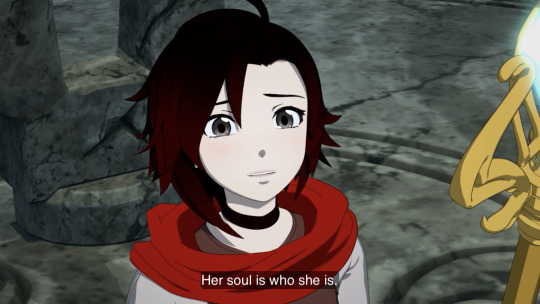
They’ve even got this entire transformation sequence for her, so it wouldn’t make sense for them to throw all that away two episodes later. In a meta context, it’s a massive waste of time and budget considering the asset creation for Penny.
Penny is a character who has already hopped bodies two times. And now we're supposed to just believe that this time it really is a final death? Just two episodes after we were explicitly told her body isn't what matters, that "Her soul is who she is" and that "the mechanical parts are just extra"? From a writing perspective, it feels strange, like your breaking a promise right after making it. And frankly, CRWBY is better than that, which makes me think this is not the actual end for her.
A possible connection between Penny, Ruby, and the Staff (thus Creation) can be seen in the intro. As Ruby is falling and being dragged down into the darkness, she is shown reaching for the staff. In the void space, Penny is the one with the relic. So with Penny having this strong connection to Creation, and the lyrics “fight for every life” playing as Ruby reaches for the staff, it’s a safe assumption to make, with the knowledge we now have, that the Staff of Creation represents Penny in this particular moment. Which could mean that V9 will be about, at least partially, fighting for Penny’s life.
Musical Hints:
In terms of music, Friend, as a song for Penny, is very dissonant from the episode itself. The song is oddly cheerful for Penny’s recent untimely death, and it overall highlights the wrong parts of death. It’s simply too happy to be a song about losing one of the most, if not the most joyous characters in the entire show. The song also abruptly ends. There’s no outro, and while this could symbolize the fact that Penny died young, it could be that the song itself is unfinished in a story sense.
What do we hear just before the song finishes, though? A progression of notes that sounds eerily similar to the last line of the opening of Volume 8. The notes for “Fight for ev’ry life” and “Who fin’lly felt alive'' share a similar melodic structure, they aren’t perfect clones of each other, but they are incredibly similar, to the point where it seems intentional. Penny may very well be the life that the opening song is fighting for. It is also worth noting that the line “Fight for every life” comes just after “Sometimes it’s worth it all to risk the fall,” which is the exact wording used for the description in the Volume 8 finale. Team RWBY risked the fall, yet, strangely the opposite of fighting for every life happened with Penny’s sacrifice. Perhaps the time to fight for every life has yet to happen, and we will see it come Volume 9.
For another thing, the lyrics for Friend are entirely centered on Penny’s feelings for Ruby, to the point where they read very much like a bittersweet love song. The music itself is incredibly cheerful, as mentioned previously, creating a mood whiplash with the end of the volume. Why would we hear a song about Penny’s feelings for Ruby, sounding like a love song, if her death is supposed to be a tragic sacrifice akin to Pyrrha’s? The song may very well be giving a clue into its future use in the show proper.
If this was meant to be a good bye song, why make it so cheerful and romantic sounding? There's only one part about her dying and even then, it's just too accepting and goes right back into cheerfulness. The song is also pretty hopeful, telling Penny's story in a fairly chronological order. And the part where she talks about sacrifice is quite pointedly followed up by one about feeling alive. It also ends with the super cheerful chorus, the word "alive" being the last... (Remember the episode title: The Final Word)
(I want to thank my friend @shadow-0f-x for writing the majority of this section! I was struggling to choose how to tackle it as I am not well versed in music theory.)
What We Didn’t See:
It is likely that Penny understood Jaune's semblance better than him and figured something out about it’s abilities in the same way that she understood Ruby's semblance better than her. She had plenty of time to observe his semblance up close as he boosted her aura to stave off the virus. Because of that intentionally timed cutaway in the finale, we don’t get to hear her explain herself after her strained “Trust me.” All of that seems really suspicious to me.
Pyrrha Parallel:
Pyrrha and Penny both sacrificed themselves to stop or stall Cinder. Jaune tried to convince the both of them to stop. With Pyrrha, he failed, while with Penny he actively helped her sacrifice herself. Doesn’t make sense for the guy who was determined not to let anyone else do what Pyrrha did, unless of course Penny assured him she’d be alright.
The Moment:
RT including the suicide hotline in the description shows that they're aware that Penny basically committed assisted suicide, seeing it as a noble sacrifice worth doing to save her friends. They're aware, and I believe they're smart enough to condemn that decision to hell and back.
The best way to do that in my opinion is to pull her back into the land of the living and let her witness first hand the consequences of throwing her life away so freely. This would show Penny how her actions affected others so maybe she could learn to truly value herself. To not think herself expendable. It would be bold and unwise to portray this choice as something good, unless it was going to be called upon later and be pointed out for how horrible it really is.
On top of this, Penny was way too content with her death, happy even. There's no way team RWBY is letting her stay content with it. It’s almost as though we're supposed to join Ruby and Co. in calling bullshit on what Penny is saying and doing because no, Penny, this is not how things are meant to work. It's as if Penny was basically saying "I want to die for my friends" because most of the volume had been about everyone else making sure she didn't die. She knows it will hurt them. She knows.
At the peak of it all, a choice like this will totally destroy Ruby. It may very well be her breaking point for Volume 9. Curiously, the moment itself is written like it’s the first choice Penny’s ever made, yet the entire Volume shows this isn’t the case. However, this is the first choice that Penny’s made solely independently and it’s rather pertinent that the choice she makes is a mistake. Outside of giving Winter the Maiden gift and saving the day temporarily, this sacrifice will not have any lasting positive effects. Jaune will be saddled with the grief of killing Penny. Ruby will have to live with losing her best friend and not being able to protect her a second time, and Winter now has the burden of the Winter Maiden abilities, making her a target of Cinder. This is a bad thing, and Penny needs to see the long term consequences.
Transfer of Power:
As we all know, colors in RWBY are really important and get a lot of focus in the show. That means the yellow we see as Penny gives Winter the Maiden Powers was intentional and likely important, no matter how insignificant it may seem. It’s possible that the transfer effect being yellow could have something to do with Jaune’s semblance. When Fria gave the power to Penny, the effect was very much blue, so this transfer should have been green since she was the one giving it this time. The weirdness of this transfer and the focus on color in RWBY really makes it look like something’s up with how that went down.
A little off topic, but Penny saying "I won't be gone, I'll be part of you." makes me think... Winter is smart, so when she gets time to think about what Penny said, maybe she'll arrive at the same question many in the audience came to; if she's literally part of Winter, can they be separated again? If Winter starts questioning that, the possibility of Penny coming back just skyrockets.
Fria actually tells Penny "I'll be gone" before giving her powers up, which is an interesting contrast to Penny telling Winter "I won't be gone". She may have gotten that line from Winter be all philosophical in V7, saying Fria was now a part of Penny, but it hits differently coming from an actual Maiden. S5o it’s possible that Maidens usually actually will be gone, but Jaune's semblance did something to change that.
This could go well with the theory that they won't need to find an aura transfer machine, or build another one, because Jaune will have a semblance evolution allowing him to do the transfer instead. It might actually be that this evolution already happened and the golden light we saw was Jaune transferring penny's aura to Winter in some way?
An observation that I find interesting is when Penny gives winter the powers, not only is the aura yellow but penny completely glows yellow too, and she obviously starts to disappear, but she doesn’t seem to fully disappear, she just glows.

It's possibly a fading out effect and she does fully fade but animation makes bright light easier, and so we don't actually see her disappear because she's dead and not gone. But it does once again emphasize the color yellow here!
And the color is coming from Penny, it does go up Winter's arm a bit, but Penny is clearly the source. This transfer is so weird and I’m not really sure how to interpret it. There's just actually no reason that we are aware of to make the effect yellow here is the thing. Unless it has something to do with either Jaune or Ambrosius, or potentially a combination of both...
Jaune’s Aura:
The way we see Jaune's aura break in the finale is strange. His aura shouldn't be breaking here. It had been long enough since he was boosting Penny, he's had time to recharge, and it didn't look like it was a strain on him at all. Plus, we know he has a lot of aura, so there probably wasn't too much to recharge in the first place.
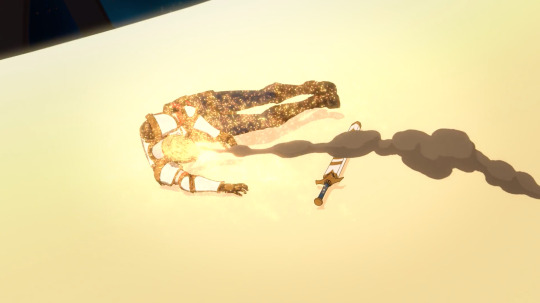
He has a massive amount of aura, it has never broken before as far as I remember. Even if it has though, that doesn’t make this occurrence any less odd. It should absolutely never be a one-hit KO. We didn't see anything that would've drained it, that should not have been enough to break his aura. Unless he did something - something that would require a huge amount of aura - that we just didn't see. That amount of aura drain is far more than just an attempt at healing would do, Jaune absolutely did something with his semblance that took up almost all of his aura.
Pinocchio Allusion:
As any Penny fan knows, her character allusion is Pinocchio, the puppet who became a real boy. Penny deviates from the allusion by having always been a real girl, as Ruby is quick to point out, but she shares many story beats with her original story including multiple deaths. In the original story, Pinocchio dies from being hung by his own strings due to his poor decision making and he dies. Sounds a little familiar, does it not? This is where his tale originally ended. Readers were unsatisfied with this ending however, so the author decided to change the story by reviving Pinocchio and teaching him to be more careful.
Unlike Pinocchio making all the wrong decisions, Penny often makes the right ones, or ones she thinks is right, when concerning others. While usually a good thing, this has meant Penny almost giving herself up multiple times during V8, her last attempt being successful. This is where Penny and Pinocchio begin to share similarities again. They are both very reckless when it concerns themselves. This carelessness comes from different places, but it ends with the same result of them endangering their lives and even sometimes losing them.
In the Disney movie, Pinocchio dies by drowning after going to rescue Geppetto and washes up on the shore (like the beach in V8’s post credit scene). His father is devastated and takes him home to grieve, but as a reward for his selflessness in rescuing his father, the Blue Fairy returns and brings him back to life, as well as granting him humanity. Penny sacrificed her life as well, and it stands to reason that she should be rewarded for it, much like her allusion was.
Penny got her maiden powers from someone with blue aura and then gave her powers to someone with blue aura. So it could be that not only Ambrosius, but Fria and Winter as well represent the Blue Fairy. It could be set up for Winter helping to bring Penny back to life once more. It’s an out there theory I admit, but it’s not outright impossible either. The Blue Fairy in Pinocchio saved him three times that I know of, so RWBY having three representations does make sense.
Geppetto wished for him to live as a real boy, but it depended on what path Pinocchio took. This is very reminiscent of Penny and Pietro. Pietro wants to see her live her life, and surely with him absent in V8C14 that didn't work, despite Penny choosing. Her father did not see her happy enough to live her life, and will only be able to learn her death through others. But Pinocchio's themes were life and being alive. So the likelihood that this is not her end yet is quite high!
A Girl That Fell Through the World:
Penny could be the girl who fell through the world. The girl in the story fled the consequences of a choice. The only person who chose her ultimate fate was Penny. The others were pushed into the void, but she chose to die. The consequence of her choice is Ruby’s grief first and foremost, which Penny won’t see. The girl who fell through the world does come back though, and the world will be changed severely with Penny’s absence. Alternatively, it could also be Penny coming back to Wonderland or wherever they currently are, as long as it’s unrecognizable to her.
What Returning Brings:
Others might say another return would have no story relevant purpose, but I wholeheartedly disagree. Penny gives a profoundly youthful, joyous, and wondrous outlook on the world and story that we hadn't seen since Ruby in Volumes 1-3(not the end), Penny returning would bring a much needed levity back in after the despair they will undoubtedly be going through. While not necessarily a huge thing in most other shows, for RWBY, a show largely about keeping up hope, an ounce of such relief is a necessity.
As much as I hate saying it, Penny’s death does actually make some narrative sense because she had to pass on the Maiden powers. (They could have done this in a number of ways, and I personally think they chose rather poorly, but I digress.) Throughout this whole volume, we can see Penny seemingly being set up to join the main cast, but would have been too strong with the powers. This also accomplishes ridding her of the burden of responsibility that comes with being a Maiden and lets her obtain the freedom that’s so important to her character.
Once she returns, seeing this grief that her actions caused, particularly to Ruby, will get her to realize more that her actions can have serious repercussions. She made a choice, but that choice hurt the people she loves. She must have known that it would but I’m not sure she ever realized just how much.
I didn’t want this post to be heavy in the shipping department, so I largely left it out, but I am going to say this one thing that could have an impact. If Nuts & Dolts is on its way to being canon, which this volume makes it feel highly likely, this could be a catalyst.
It could prompt an arc for the both of them in which Penny learns to live her life fighting for her loved ones, rather than sacrificing it for them. A relationship could potentially start from there. And Ruby seeing Penny learn these things may also help her to stop doing the occasional but very dangerous and reckless things she does. Ruby witnessing Penny coming to terms with what she did to the people that care about her would actually make her stop to think “wait, is this how everyone else would feel if I got myself killed?” That would be a very important moment of character growth for her.
I’m certain there are other significant things that Penny returning can bring to the show. And there are definitely more sections I could add to this. At this point though, assuming anyone even made it this far, I think I’ve been going long enough already. So let’s just roll into the outro!
As painful and hopeless as it seems, I'm choosing to trust them with this because there is absolutely no way they didn't see backlash coming. The way this finale went makes me think that they calculated for backlash and aren’t jumping into something they don’t have a plan to recover from. Whether this trust is unfounded or not remains to be seen, but I don’t think it is currently. I do think, however, that the cause of this backlash was a major misstep. Now that it has happened though, they have a chance to do something good with it.
I know for a lot of you, trust in CRWBY has been damaged, some even irreparably so. And for those that feel this way, I don’t blame you. My trust in them took a hit too, but isn’t broken completely yet. There are many ways that they can bring her back that would make sense with the narrative, they have the ability to make it right, and after going over all of the hints and general weirdness of things many times, I think they will.
I'm feeling pretty confident now and I really didn't expect that to happen at all to be honest. But discussing and theorizing with the discord server seriously helped get my hopes back up surprisingly fast! It’s actually thanks to all of them that this gigantic post even happened! So thanks a ton my fellow Dolts! And a special thanks to!!
@arcana-amicus
@catontheweb
@cosmokyrin
@gaydontmesswithme224
@jammatown919
@shadow-0f-x
They really helped get this thing across the finish line!
And thank YOU for reading all~ of this! I sincerely wish it gave you some of the hope and confidence that I now have!
#RWBY#rwby vol8#rwby v8#rwby spoilers#Penny Polendina#nuts and dolts#mechanical rose#a little#Essay#more like dissertation#I haven't written this much in#probably ever actually#Have HOPE people!
384 notes
·
View notes
Note
On your comments about Jack: ye-es, in the sense that Jack is a character who definitely deserved better than he was treated by the characters. The way Dean especially treats him reflects very badly on Dean, no question. But, speaking as a viewer, I think the perspective needs to shift a little bit.
To me, Jack is Dawn from Buffy, or Scrappy Doo. He’s an (in my opinion) irritating kid who is introduced out of nowhere to be both super vulnerable and super OP, and the jeopardy is centered around him in a way that has nothing to do with his actual character or relationships. He’s mostly around to be cute and to solve or create problems — he never has any firm character arcs or goals of his own, nor any deeper purpose in the meta narrative. In this way, he’s a miss for SPN, which focuses heavily on conflicts as metaphors for real life.
Mary fits so much better in that framework, and introducing her as a developed, flawed person works really well with the narrative. It is easy for us to care about Mary, both as the dead perfect mother on the pedestal and as the flawed, human woman who could not live up to her sons’ expectations. That connection is built into the core of SPN, and was developed over years, even before she was a character. When she was added, she was given depth and nuance organically, and treated as a flawed, complex character rather than as a plot device or a contrivance. She was given a voice and independence, and became a powerful metaphor for developing new understandings of our parents in adulthood, as well as an interesting and well-rounded character. You care that she’s dead, not just because Sam and Dean are sad, but for the loss of her development and the potential she offered. So, in that sense, I think a lot of people were frustrated that she died essentially fridged for a second time, and especially in service of the arc of a weaker character.
And like, you’re right, no one can figure out if Jack is a toddler or a teenager. He’s both and he’s neither, because he’s never anything consistently and his character arc is always “whatever the plot needs it to be.” Every episode is different. Is he Dean’s sunny opportunity to be a parent and make up for his dad’s shitty parenting? Yes! Is he also Dean’s worst failure and a reminder that he has done many horrible things, including to “innocent” children? Yes! Is he Cas’s child? Yes! Is he Dean’s child? Yes! But also, no! Is he Sam’s child? Yes! Is he a lonely teenager who does terrible things? Yes! Is he a totally innocent little lamb who doesn’t get why what he is doing is wrong? Yes! Is he the most powerful being in the universe? Yes! Does he need everyone to take care of him? Yes! Is he just along for the ride? Yes! Is he responsible for his actions? Kinda??? Sometimes??? What is he???
Mary as a character is narratively cohesive and fleshed-out. Jack is a mishmash of confusing whatever’s that all add up to a frustrating plot device with no consistent traits to latch on to. Everything that fans like about him (cute outfits, gender play, well-developed parental bonds with the characters) is fanon. So, yes, the narrative prioritizes Mary. Many fans prioritize Mary, at least enough that Dean’s most heinous acts barely register. To the narrative (not to Cas, which is a totally different situation), Jack is only barely more of a character than Emma Winchester, who Sam killed without uproar seasons earlier. He’s been around longer, but he’s equally not really real.
I debated on responding to this because, to tell the truth, I think we fundamentally disagree on a number of subjects and, as they say, true insanity is arguing with anyone on the internet. However, you spent a lot of time on the above and I feel it's only fair to say my thoughts, even if I don't believe it will sway you any more than what you said changed my opinions.
I'm assuming this was in response to this post regarding how Jack's accidental killing of Mary was treated so severely by the brothers, particularly Dean, because it was Mary and, had it been a random character like the security guard in 13x06, it would have been treated far differently. However, then the argument becomes less about the reaction of the Winchester brothers to this incident and more the value of Jack or Mary to the audience.
I believe we need to first admit that both characters are inherently archetypes—Mary as the Madonna character initially then, later, as a metaphor for how imperfect and truly human our parents are compared to the idol we have as children, and Jack as the overpowered child who is a Jesus allegory by the end. Both have a function within the story to serve the Winchester brothers, through whose lens and with whose biases we are meant to view the show's events. We also need to admit that the writers didn't think more than a season ahead for either character, especially since it wasn't initially supposed to be Mary that came back at the end of season 11 but John, and they only wrote enough for Jack in season 13 to gauge whether or not the audience would want him to continue on or if he needed to be killed off by the end of the season. Now, I know we curate our own experiences online which leads to us being in our own fandom echo chambers, however it is important to note that the character was immediately successful enough with the general audience that, after his first episode or two, he was basically guaranteed a longer future on the show.
I have to admit, I’m not entirely sure why the perspective of how his character is processed by some audience members versus others has any bearing on the argument that he deserved to be treated better overall by the other characters especially when taking their own previous actions in mind. I’m not going to tell you that your opinion is wrong regarding your feelings for Jack. It’s your opinion and you’re entitled to it, it harms no one to have it and express it. My feelings on Jack are clearly very different from your own, but this is really just two different people who processed a fictional person in different ways. I personally believe he has a purpose in the Winchesters’ story, including Castiel’s, as he reflects certain aspects of all of them, gives them a way to explore their own histories through a different perspective, and changes the overall dynamic of Team Free Will from “soldiers in arms” to a family (Misha’s words). In the beginning he allows Sam to work through his past as the “freak” and powerful, dangerous boy wonder destined to bring hell on earth. With Dean, his presence lets Dean work through his issues with John and asks whether he will let history repeat itself or if he’ll work to break the cycle. Regarding Cas, in my opinion he helps the angel reach his “final form” of a father, member of a family, lover and protector of humanity, rebellious son, and the true show of free will.
From strictly the story, he has several arcs that work within themes explored in Supernatural, such as the argument of nature versus nurture, the question of what we’re willing to give up in order to protect something or someone else and how ends justify the means, and the struggle between feeling helpless and powerless versus the corruptive nature of having too much power and the dangerous lack of a moral compass. His goals are mentioned and on display throughout his stint on the show, ones that are truly relatable to some viewers: the strong desire to belong—the need for family and what you’ll do to find and keep it.
With Mary, we first need to establish whether the two versions of her were a writing flaw due to the constant change in who was dictating her story and her relationship to the boys, which goes against the idea that her characterization was cohesive and fleshed-out but, rather, put together when needed for convenience, or if they both exist because, as stated above, we are seeing the show primarily through the biased lens of the Winchester brothers and come to face facts about the true Mary as they do. Like I said in my previous post, I don’t dislike Mary and I don’t blame her for her death (either one). However, I do have a hard time seeing her as a more nuanced, fleshed-out character than Jack. True, a lot of her problems are more adult in nature considering she has to struggle with losing her sons’ formative years and meeting them as whole adults she knows almost nothing about, all because of a choice she made before they were born.
However, her personal struggles being more “mature” in nature (as they center primarily on parental battles) doesn’t necessarily mean her story has layers and Jack’s does not. They are entirely different but sometimes interconnected in a way that adds to both of their arcs, like Mary taking Jack on as an adoptive son which gives her the moments of parenting she lost with Sam and Dean, and Jack having Mary as a parental figure who understands and supports him gives him that sense of belonging he had just been struggling with to the point of running away while he is also given the chance to show “even monsters can do good”.
I’d also argue that Jack being many ages at once isn’t poor writing so much as a metaphor for how, even if you’re forced to grow up fast, that doesn’t mean you’re a fully equipped adult. I don’t want to speak for anyone else, but I believe Jack simultaneously taking a lot of responsibility and constantly trying to prove to others he’s useful while having childish moments is relatable to some who were forced to play an adult role at a young age. He proves a number of times that he doesn’t need everyone to take care of him, but he also has limited life experience and, as such, will make some mistakes while he’s also being a valuable member of the group. Jack constantly exists on a fine line in multiple respects. Some may see that as a writing flaw but it is who the character was conceived to be: the balance between nature or nurture, between good and evil, between savior and devil.
Now, I was also frustrated Mary was “fridged” for a second time. It really provided no other purpose than to give the brothers more man pain to further the plot along. However, this can exist while also acknowledging that the way it happened and the subsequent fallout for Jack was also unnecessary and a sign of blatant hypocrisy from Dean, primarily, and Sam.
And, yes, Jack can be different things at once because, I mean, can’t we all? If Mary can be both the perfect mother and the flawed, independent, distant parent, can’t Jack be the sweet kid who helps his father-figures process their own feelings on fatherhood while also being a lost young-adult forcing them to face their failures? Both characters contain multitudes because, I mean, we all do.
I can provide articles or posts on Jack’s characterization and popularity along with Mary’s if needed, but for now I think this is a long enough ramble on my thoughts and feelings. I’m happy to discuss more, my messenger is always open for (polite) discussion. Until then, I’m going to leave it at we maybe agree to disagree.
#long post#long ask#so long answer#guys it's 1 am#i hope this made sense#watch me read this after sleep and register things i wish i said#oh well#jack kline#mary winchester#spn#supernatural#spn critical#supernatural critical#kinda?#eh just in case#spn meta#supernatural meta#jack meta
25 notes
·
View notes
Note
that part when sugimoto kills jack the ripper and he says "rather than worrying about who gave birth to you, the important part is what you live for" is a nice allusion to ogata being all like: if i had present and loving parents i wouldnt've turned out so fucked up :/ like naaaah man i dont believe it, you would still be the same insane man you are, ogata had present grandparents who cared enough about him to feed him and take care of him when his mother couldnt, (and he liked his granny enough to not kill huci) but still poisoned them for no reason before going to the army. also killing your mother at cold blood at the age of 8 thinking your doing something good for her is not something a good and sane person would do im sorry. i wish he could find peace one day but as you said, he wouldnt recognize it even with a microscope, that man was broken from the start. sad
hmmm i don't know. sugimoto saying that to jack was immediately picked up as having a connection to ogata (not through sugimoto himself lol he's not aware of ogata's past, narratively speaking), and people being able to overcome natural circumstances and better themselves is certainly a theme in gk, or the opposite. look at usami. i'm fully convinced that usami and ogata are juxtaposed and are supposed to be each other's foils - they might be two peas in a pod, but their backgrounds are pretty much the opposite. usami had most stuff ogata lacked as a child yet he turned out the way he did. look at this, for example:

when i say that noda is a good writer, this is what i mean. it's the way he conveys information subtly and succinctly, his attention to detail and the cohesivity of the story. usami's parents were given exactly one page in the whole manga, but it conveyed quite a lot of information. they loved each other - enough to have four children despite being obviously low income, enough to flirt with each other in front of their children, who are welcoming of their display of affection, therefore it's obvious that they don't lack in affection from their parents either. it's a nice detail, an important one, and noda made sure we know. usami had exactly what ogata is convinced makes him defective - a loving family, a warm home, a happy childhood. yet usami still turned out not alright.
however... people are different and complex. two people can be brought up in identical circumstances, yet turn out nothing alike. human brains are incredibly complicated, any given event in a person's life can have a very long-lasting rippling effect and be a turning point. any given psychology course will dedicate a lot of time to developmental and child psychology and therapy is majorly focused on looking at the core of things and searching for it in early childhood. children are malleable because their brains are developing, but once a neuro connection is strongly established, it's quite hard to change later - not impossible, neuroplasticity is a thing, but hard, and requiring a conscious effort. humans are social animals, community is unimaginably important to us, connecting to others is arguably one of the core needs of a human being. we learn how to connect with others from the moment of our birth, and naturally the first-comers, the people who establish us as human by taking care of us and connecting with us are our primary care-givers - namely, our parents.
the truth is that since the child-parent bond is typically the first one in most humans' lives, the relationship between a child and their parents is tremendously important. the other truth is that if a child is not loved and not desired, it is guaranteed to fuck them up for the rest of their life. we need to be loved early on in our childhood in order to be able to create healthy connections with others later in life, it's a must for natural, lasting, positive relationships. a person rendered unable to form healthy bonds with others will still typically seek connection, except in their case they will do it in negative, (self-)destructive ways. which is exactly ogata's case.
when i think ogata i think tunnel vision. he's incredibly self-aware in some areas while being completely blind in others, his perception of himself and others is so wrapped in itself it gives him an emotional handicap and an utter inability to accurately asses his circumstances. i think he is absolutely correct in blaming the fact that he's defective and lacking something fundamental on his parents being the way they were. i do feel sympathy for both him and his mother. you're saying that his grandparents were good to him because they fed him, but don't forget their circumstances either. they were poor. poor enough to either sell their daughter into prostitution or just accept the fact, though i'm inclined to think that they sold her because it was commonplace to do that in order to cover debt and get rid of a hungry mouth. doesn't strike me as the most affectionate household. people keep pets and feed them, but they don't give their cats or dogs the kind of affection a child needs.
i do agree with you that there was obviously something very off about ogata from the very beginning. thing is, even with extremely mentally unstable parents, even with neglect, even with poverty, children rarely poison their mothers on purpose. sure his logic was simplistic and childish, he didn't do it out of malice or ill will, he even thought that he's doing it for her sake, but he still purposefully murdered her. people who aren't naturally missing a few screws don't do that, ogata was well past the age of not understanding why hurting others is wrong.
he's got plenty of traits that make him unlikeable as a person. he is petty, arrogant, self-absorbed, rude, selfish, treacherous, awkward, has poor social skills, berating, 0 charisma, a liar etc etc... these traits can be found aplenty in people who had happy childhoods too. would he still be an asshole if he had better circumstances? most probably. the difference is that he'd be much less likely to self-sabotage, wouldn't waste so much time on introspection, and wouldn't react to basic, human kindness with murder. at the end of the day he's a fictional character and not a real person, being the way he is is very deliberate and constructed, and if he were different or had a different life then he wouldn't be ogata.
#like he'd still probably be an ass but either more like koito or patrick bateman style lmao#anon#btw bold of sugimoto to talk shit when HE had good and loving parents
14 notes
·
View notes
Text
i am doing SO much interesting reading this morning and it’s making me feel so invigorated and alive!! one hazy thing i am thinking about today is how much of social media culture (but maybe especially twitter) encourages people (maybe esp young people) to focus on & amplify the negative aspects of their lives, characters, relationships, personal experiences, etc., while sort of tacitly discouraging (by not rewarding as strongly) the sharing of strengths, talents, dreams, aspirations, or the fulfilling aspects of our lives/relationships/work.
these hazy thoughts are attached to some even hazier thoughts i’ve been working through over the past year or so, about how social media rhetoric around “destigmatizing mental illness” may help to reduce shame around depression, anxiety, etc. (i’m not entirely convinced on that point), but in many ways seems to more deeply entrench people in a depressive mindset. the way social media encourages people to talk about & share experiences of mental illness tends to strongly reward divulging painful or negative aspects of our lived experience, while dismissing or not directly rewarding (with attention, engagement, etc.) efforts to share practical tools for refiguring the habits of mind and features of one’s environment that can entrench depressive symptoms. social media culture elicits and strongly rewards expressions of suffering, and it also seems to encourage people (especially young people) to see mental illness (or the distress that mental illnesses cause) as a core aspect of their identity, ie, an essential and immutable part of who they are. it’s almost like, under the guise of “accepting ourselves as we are,” we are encouraged to see our depression, anxiety, bipolar symptoms, etc as part of our “authentic selves,” which i think can subconsciously dissuade us from pursuing treatment or lifestyle changes that could significantly alleviate the suffering those conditions cause us.
i also feel very strongly (and this is anecdotal experience drawn from almost 10 years of working closely with college students) that over the past decade social media culture has normalized depression and anxiety in ways that i find extremely disturbing. many of my students now act as if it is completely normal and unremarkable for a person to live with (and to regularly express) lowgrade feelings of “i hate myself,” or “i’m trash,” or “i want to die / it would be better if i were dead.” it also seems to be much less common for students to talk openly about pursuing happiness, well-being, a sense of personal fulfillment in one’s work and relationships, etc. of course, there are absolutely students who still prioritize those things (i see it in their work & in the way they pursue and talk about that work). but they seem to do so in increasingly quiet, inwardly-directed ways, as if there is something slightly taboo about openly expressing a desire to be fulfilled by one’s work, or about openly prioritizing emotional well-being.
i am getting way too far into the territory of drawing Big Conclusions from anecdotal observations so i will back off for now!! BUT I do want to note that i tend to work with students who self-identify as very leftist (somewhere on the progressive to radical spectrum) and who have an avowed concern with a wide range of social and environmental justice issues. now THIS is the haziest thought of all, but i feel like there is a link between what i am describing in social media culture & the extremely-online left’s obsessive focus on what indigenous scholar & researcher Eve Tuck calls “damage-centered narratives.” Tuck defines damage-centered narratives as accounts of the world, or of one’s self and community, that center experiences of exploitation, trauma, damage, pain, loss, and oppression.
Tuck argues that progressive and radical movements tend to rely on a flawed “theory of change,” namely that obsessively and endlessly documenting the damage caused by oppression will somehow move the dominant group to redress historical & ongoing injustices—when actually, historically, the dominant or oppressive group is almost never moved or shamed into changing course. damage-centered narratives not only fail to produce the desired change, but also tend to leave people with a distorted understanding of themselves and their communities as fundamentally damaged, flawed, incomplete, too traumatized or oppressed to heal, etc. in essence, damage-centered rhetoric teaches both marginalized people and members of the dominant group to see damage as both a normal and essential part of the marginalized group’s identity. Tuck’s argument is not that we should pretend like the damage doesn’t exist, or stop documenting the suffering it causes. but she does argue that we need to think about what we center in the stories we tell about ourselves and our communities, and about what happens to our sense of agency and wholeness when we repeatedly choose to center trauma and suffering in ways that crowd out stories of individual & community power, resilience, agency, and healing.
i feel like there’s some link here—like, some way in which social media culture’s rhetoric around “destigmatizing mental illness” has gotten entangled in these leftist damage-centered theories of change. or maybe it’s less of a direct connection and more like, Tuck’s analysis offers a useful framework for describing what i observe in these social media cultures. idk! still working through the tangled threads of this thought (and it’s possible that the connection to political views isn’t the most compelling part of this observation, just a personal pet idea of mine that i am always trying to fit into this narrative).
anyway i think i just want to end by saying that it is in fact NOT normal for lots of young people (or older people!) to be living everyday with a lowgrade feeling of wanting to die, and that we should be really concerned first and foremost with the political and economic conditions that are producing those feelings, but also with a social media culture that presents those feelings as “normal” and tacitly rewards them. but even that articulation does not feel very precise! because i am not saying at ALL that the solution is to stop talking about the lived conditions of our lives, or the fact that many of us DO live in a state of distress. it’s not the sharing of feelings that concerns me at all (all i do all day is share my feelings on the internet!!! sharing and reflecting on feelings is Good, actually!!). rather, it’s the way in which the sharing itself (of feelings of despair, depression, worry, social isolation, hopelessness, suicidal ideation, etc.) becomes an end point & a “good” in and of itself. the sharing becomes disconnected from, idk, a deep culture-wide examination of the conditions that produce those feelings, or from a culture-wide mobilization to materially address those conditions.
AND ALSO, to circle back to my very first point: when the sharing of negative emotions & experiences is rewarded and treated as an end in and of itself (ie it does not spark further individual or collective action/response), it tends to crowd out (and perhaps even render taboo) the sharing of strengths, hopes, dreams and aspirations, our efforts to build more fulfilling lives and relationships, and so on. sharing and focusing on the positive aspects of our lives does not automatically solve the negative stuff, and obviously we are often going to find ourselves in situations where we don’t have a lot of agency or the power to change our material circumstances. the negative stuff is real, and the way it makes us feel deserves to be closely and compassionately attended to. but i just worry about a particular kind of dysfunctional coping mechanism that encourages us to treat the shittiest, most distressing aspects of our lived experience as somehow central or essential to our identities, while persistently downplaying or discouraging us from cultivating the traits and habits of mind that make life worth living & our personal and collective well-being worth striving for.
#is there anything in this?#probably not! but#just working through a thought#i also feel like#i hate to invoke identity/personal experience as if it automatically qualified me to speak with authority on the subject#but it does seem important to note that i speak not from a place of 'mental illness isn't real / isn't that bad! just get over it!'#but from a place of 'for a long time my head was an extremely bad and painful and distressing place to live in#and i have spent a lot of time reading widely in research on counseling & psychological well-being & emotional regulation#and developing strategies that are probably similar to what years in therapy might've taught me#so as to stabilize myself & heal'#my goal is not to be like SOCIAL MEDIA BAD (although IT IS BAD OK. IT'S PRETTY BAD)#but to understand the environments my students are growing up in & to kinda try to figure out the toxic sludge they are like#swimming in all the time#so that i can figure out how to effectively help people move from 'i lowkey want to die all the time' to a diff way of living in the world
29 notes
·
View notes
Photo
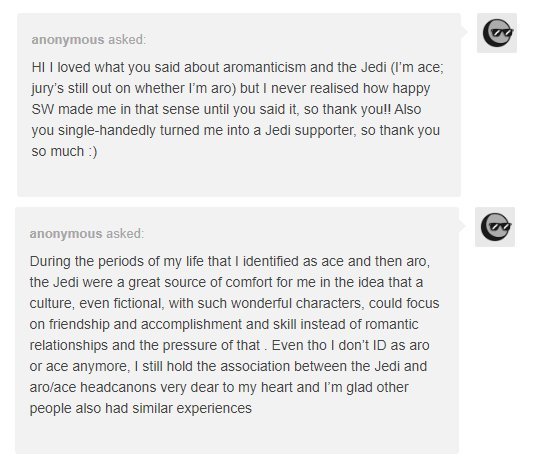
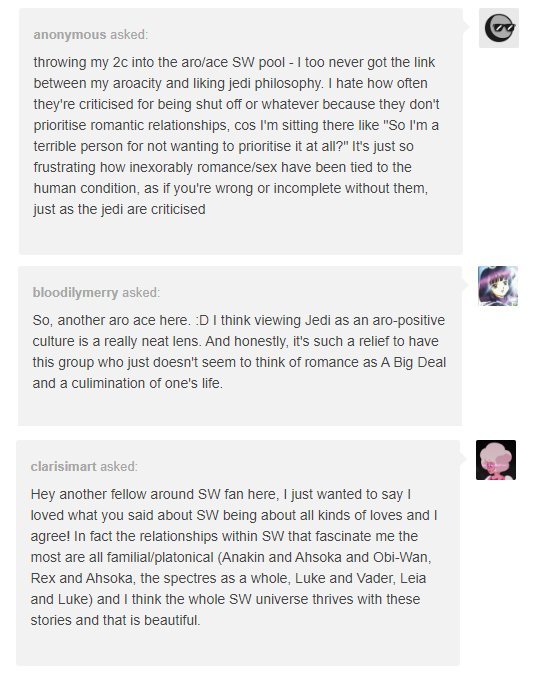
Hi! I went through a similar phase as several of you--I never really connected the dots between my own aro/ace qualities and my gravitating towards the Jedi culture until someone else pointed it out and then everything just sort of clicked together in my head in a way that made so much sense.
And I think it can be really useful to view the Jedi through this lens of aro/ace culture, not because people are obligated to agree to this interpretation (they absolutely are not obligated to do so!) but because it provides a framework of reference for why not being drawn to romance and/or sex is not a foundational flaw in characters. That there might even be an entire group of people who find that to be really satisfying and fulfilling--I mean, look at how many people gravitated to this discussion (or were already here) in just one day on one person’s blog on one social media platform. It’s not hard at all for me to think, yeah, I’m looking at us building aro/ace culture of our own, it’d be easy for an in-universe group of people to do the same, and the lack of romance and/or sex wouldn’t be them suppressing their feelings or lacking something fundamental about the human condition, either.
That’s part of why the Jedi mean a lot to me--there are other things as well, I greatly value their “face the shit within yourself, acknowledge that shit, and then let that shit go, because holding onto it is poison that will hurt you”, as someone who came to the same conclusions long before I was ever a Star Wars fan. I love the worldbuilding, I love the psychic space wizards aspects, I love how goddamned extra they are about everything, etc.
But a culture that not only doesn’t prioritize romance/sex, but actively values other things and finds meaning in those things? That we see they have friendships and connections all over the place, that they find joy and meaning in teaching their students (and learning from their students, just as much as they teach them), that they find joy in helping others and protecting others, that they love through different ways, that they love the galaxy around them, they love their brothers and sisters in the Force, that they love their community and their culture? That they just don’t seem to really want love and romance?
Even those that do feel romantic feelings (setting Anakin aside, of course) still find the Jedi path to be a fulfilling one. Obi-Wan may have had romantic feelings for Satine (which was apparently fine, it’s about his commitment and where he places it, I’m pretty sure that was the whole point of the Obi-Wan/Satine relationship, to be a narrative foil for Anakin/Padme, where Anakin does prioritize his feelings for Padme over his morals and judgement, which results in disaster of epic proportions) but he is a fully realized character without them. He loves--we see that with Qui-Gon, Ahsoka, Luke, Anakin--that he cares deeply, that he’s a compassionate person, that he lives a life that he considers satisfying. He becomes a Force Ghost and we can see him looking out over Endor, at the things that have finally been set back to rights, and he’s happy.
Even within canon, the Jedi that feel restless and like something is wrong in this galaxy, they’re not restless because they want romance/sex, but because they want to do more as Jedi. They want to help more people, they want to do more good in the galaxy, and do you know how much that means to me? That even those who are dissatisfied (setting aside those that leave the Jedi Order because they want to have romantic relationships, which are treated warmly by the Order and by the people who left, like Tula’s grandmother) don’t have to be shoved back into the same box so many mainstream properties shove the characters into? That it’s not about how, oh, they want traditional nuclear families, but instead that they want MORE of what the Jedi are--more love as shown through service to others, more love as shown through helping others.
Do you know what a relief it is to have a group of people who find fulfillment in the same kind of things that I do? Friendships and helping others and learning/teaching about the galaxy around them and self-reflection/understanding and accomplishments the like? That these are treated, not just as valuable, not even just as valuable, but more valuable to these specific people? Without demonizing that they’re totally cool with other people wanting romantic love? DO YOU KNOW HOW MUCH THAT MEANS TO ME?
DO YOU KNOW HOW MUCH IT MEANS THAT THE JEDI DON’T REALLY SEEM INTERESTED IN ROMANCE OR SEX AND INSTEAD FIND SATISFACTION IN OTHER THINGS? THAT IT’S NOT ABOUT SUPPRESSING YOURSELF, BUT THAT PEOPLE SOMETIMES JUST REALLY DON’T CARE ABOUT THOSE THINGS. SOMETIMES EVEN LARGE GROUPS OF PEOPLE.
That the Jedi aren’t just “hey, this one Jedi can be read as aro/ace, that’s neat” but instead the Jedi said, “Hey, how about an ENTIRE CULTURE that vibes hard with aro/ace culture?” That it’s the one mainstream culture that I can think of that really can be interpreted to say, “You’re not just an outlier, but YOU’RE THE NORM in this fictional society.” Do you know what kind of value that has to me, as someone who only has the tiniest scraps of representation for this character or that character who maybe might be like me, but are rarely confirmed and are almost always The Different One? Do you know what kind of value it has to me that it’s not just one or two of them, but that THE CULTURE ITSELF is where I would fit in? That they built an entire society where nearly all of them seem to be Like Me?
AN ENTIRE SOCIETY OF PEOPLE I WOULD FIT IN WITH?
Which isn’t even getting into the worldbuilding specifics that are so much fun to play with--like, can you imagine what it would be like to have this psychic connection to this vast field of energy in the cosmos? To be able to sense the feelings of others around you, to feel their presence even when they’re halfway across the galaxy, to just know what they’re feeling? To be constantly surrounded by the lights of those souls that are gently nudging up against your own? The warmth and peace of the Jedi Temple that isn’t just what you see/hear/touch, but also what permeates your very thoughts, the soothing balm on your soul that it would be?
Can you imagine what it would be like to have this in your head all the time?

A familiar sense of warmth, of belonging, of finding himself part of an endless lattice of connections that held him and everything else, each fixed in its proper place. A Force.
Romance and sex can be wonderful. But they are not the sole defining qualities of what it means to be sentient or what it means to be fulfilled. The Force being described as an endless lattice of connections and warmth, that sounds incredibly wonderful and human to me, that sounds incredibly fulfilling and like everything I could possibly want.
That is what the Jedi seek and have found. That is the foundation of their culture. That is the culmination of their lives.
This is why their relationships are so wonderful and I’m so glad that the iconic Jedi relationships, whether we as fans turn towards shipping them or not, whether we joke about how much you can read into them or not, are ones that are all about other aspects that are just as epic and important.
Obi-Wan’s most iconic relationships are with Luke, Anakin, Qui-Gon, Ahsoka. They’re all incredible ones and it’s not to disparage his feelings for Satine (I love them as a pairing, too!), but that his character is defined more by familial and platonic relationships being just as galaxy-shaking as romantic ones might have been in another story? That means a lot to me.
Anakin is, of course, driven by his romantic relationship with Padme, but think about how important his relationships with Obi-Wan and Ahsoka are, ones that don’t have to be seen through the lens of romance. That the ultimate climax of the prequels was Anakin’s fight with Obi-Wan, a familial connection. That the ultimate climax of TCW was about Ahsoka’s relationship with Anakin, another familial/platonic connection.
Ahsoka is a rising star in the SW franchise and her most iconic connections are with Anakin and Rex, both of which do not have to be interpreted through the romantic/sexual lens, that are complete just as they are presented. That even when she can no longer be a Jedi, even when that possibility is stolen from her, she still doesn’t need to be defined through romance or sex.
Yoda has many important, iconic relationships and is such a central character to the mythos and mythology of Star Wars. His relationship with Luke is one of the most foundational of the OT, his relationship with Obi-Wan is important when you dig further into the supplementary material, his relationship with Anakin creates some of the most memorable scenes of the prequels. All without ever having him desire a girlfriend. Hell, the movies had Yaddle right there and you know what? She wasn’t Yoda’s girlfriend, he wasn’t her boyfriend, that’s not what they were to each other, because they didn’t really seem to have any desire for that.
THAT’S ONE OF THE REASONS I LOVE THE JEDI. They show compassion and care and love all over the place, but they do it through George Lucas’ views on how people should strive to be, and they do it not through romance, but through friendship and helping others and seeking greater understanding of self-knowledge and artistry through the Force, and none of that should ever make them lesser, just as aromantic and asexual people seeking those same things does not make them lesser.
We are people who love just as much as anyone else, we have fulfilling and wonderful lives, I don’t know any aro/ace person who would really even want to change themselves, we find ourselves to be perfectly fantastic the way we are. I don’t feel some part of me is missing, I don’t feel I’m less interesting because I’m aro/ace, I love being the way I am. I love how much my friends and family mean to me, I love how much joy I get out of caring for animals or helping other people or even simply yelling about Star Wars with them. My connections to people are just as wonderful as anyone else’s, regardless of how they’re not in the romantic/sexual category.
And, so too are the Jedi.
198 notes
·
View notes
Link

*desperately* click! click!

Thirsty Sword Lesbians battle the Lady of Chains when her enforcers march down from the frosty north. They rocket through the stars to safeguard diplomats ending a generations-old conflict. They sip tea together and share shy glances at the corner cafe with their old classmates and comrades. Even when swords are crossed, they have the potential to connect more deeply than anyone expects.
A sword duel can end in kissing, a witch can gain her power by helping others find love, and an entire campaign can be built around vagabond matchmakers piloting their sentient gay spaceship from system to system.
If you love angsty disaster lesbians with swords, you have come to the right place.
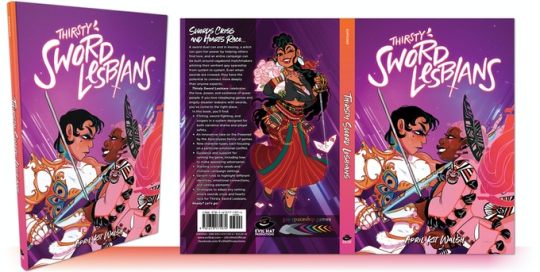

Thirsty Sword Lesbians by April Kit Walsh is a roleplaying game that celebrates the love, power, and existence of queer people—specifically queer people with swords and a lot of feelings. Flirting, sword-fighting, and barbed zingers all mix together in a system designed for both narrative drama and player safety. This innovative take on the Powered by the Apocalypse engine is a breeze to learn and ensures that no matter how the dice fall, something interesting happens to move the story forward.
In this game, you will solve problems with wit, empathy, and style, fight when something is worth fighting for, and redeem (or seduce) at least a few of your adversaries. You’re part of a community that embodies important ideals and you’ll strive to protect it and make your world better.

Play as one of nine character types: Beast, Chosen, Devoted, Infamous, Nature Witch, Scoundrel, Seeker, Spooky Witch, and Trickster. Each explores a particular emotional conflict that drives the drama and shapes your character’s story. Are you a Beast, faced with the dilemma of expressing your inner truth versus fitting in to a society that demands you conform? A Devoted, who sacrifices for others while struggling to care for yourself? A Trickster, who craves closeness but fears vulnerability? In long-term play, you may even resolve your initial arc and advance into a different playbook as you continue to change and grow, facing new challenges.
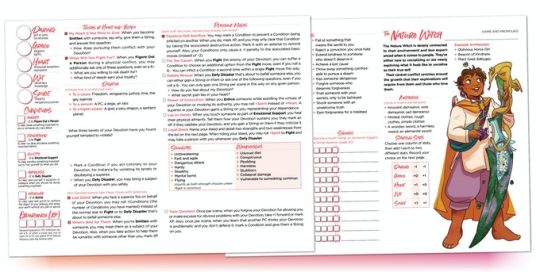
Backers get immediate access to the playbooks too.
They're form fillable!
Thirsty Sword Lesbians provides clear, robust guidance and support for running the game, including how to make appealing adversaries, set the tone, structure play, and create a safe environment at the table. Handy reference sheets help you narrate appropriate twists and drama on the fly, depending on the feelings and character types you have in play.
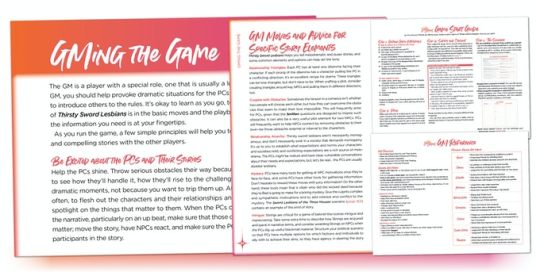
Want to jump into a one-shot? The game includes six adventures that can stand alone or kick off a longer series: Sword Lesbians of the Three Houses, Best Day of Their Lives, Constellation Festival, Gal Paladins, and Monster Queers of Castle Gayskull. For even more inspiration, it features The Starcross Galaxy campaign setting along with five more settings from these contributing authors:
Lesbeans Coffehouse by Dominique Dickey
Neon City 2099 by Jamila Nedjadi
The Three Orders of Ardor by Whitney Delaglio
Les Violettes Dangereuses by Jonaya Kemper
Yuisa Revolution by Alexis Sara
We also provide ample guidance on how to create your own tales of fighting with swords and falling in love, along with a world building worksheet, variant rules, and a set of starting scenario seeds to play with. Because the game focuses on feelings and relationships, it’s a lens you can use to play in a variety of genres. If you like slashfic of characters with swords, you’ll love this game.

Thirsty Sword Lesbians is explicitly designed to tell melodramatic and queer stories; tales fraught with relationship triangles, mystery, intrigue, relationship anarchy, celebration, and revolution. It includes rules to highlight different identities, emotional connections, and setting elements.
This game is not for fascists, TERFs, or other bigots. The team behind Thirsty Sword Lesbians supports racial liberation, intersectional feminism, and queer liberation. We love and respect transgender people, nonbinary people, intersex people, and women. This game is a joyous celebration of lives and identities otherwise marginalized. If you don’t agree, fix your heart before sharing a table with other people.
What if... not Thirsty? The game fundamentally assumes that the characters crave connection, but that connection doesn’t need to be sexual or romantic. We offer you options for changing how the game addresses connection in our variant rules section.
What if... not Swords? It’s simple enough to swap out a different hand-to-hand combat option. Your campaign or your character can use a labrys, the double-bladed axe that became a lesbian icon in the late 20th century. You can use different styles of unarmed combat or even grapple using telepathic self-projections. It’s also possible to replace the swords with mecha, starships, or guns, but it requires some thought and the book will help you think about how to ensure that it stays intimate and relationship-focused. The conflict doesn’t have to be physically violent, either; you can use any kind of conflict that’s adrenaline-inducing and close-quarters.
What if... not Lesbians? We’ll let you in on a secret: you don’t have to play a lesbian. The game plays with themes that are common for all sorts of people who are marginalized on the basis of gender and sexuality, as well as feelings that go beyond the queer experience. If you want to play thirsty sword cishets, we’re not going to stop you—just don’t be surprised if the game turns them queer.
What if... I’m not good at flirting or zingers? You don’t have to be witty or good at flirting in real life to play a character with those skills, and not every character in Thirsty Sword Lesbians is good with words. Shy and awkward sword lesbians find love, too. You’ll find them well-represented in this game.
Ready? Let’s Go!
===============================================
Kickstarter campaign ends: Thu, November 12 2020 9:00 PM UTC +00:00
Website: [Evil Hat Productions] [facebook] [twitter]
56 notes
·
View notes
Text
you know, where I'm headed, there'll be trouble...
...Ok, but can we talk about Sins of the Past?...
I’m not usually a fan of pilot episodes. Even the ones for my very favourite tv shows. They don’t tend to age well, hardly ever look like the shows they will become, and often suffer - like many First Seasons - from a laundry list of Unfortunate Things: actors still unsteady on their character’s legs, inconsistencies in plot and pacing and motivation, secondary characters that are too one-dimensional, low-budget wardrobe and set design. It takes time for a show to settle into itself and then a little more for it to evolve. So, it can be tough to revisit pilot episodes - awkward and maybe a little cringey.
Surprisingly, though, that’s not really the case with Sins of the Past. I say ‘surprisingly’ because the first episode of Xena Warrior Princess automatically starts out at a disadvantage. It’s a mid-90s, syndicated, genre television show, so it already contains a lot of elements that are fundamentally at odds with our modern sensibilities regarding visual storytelling. Coupled with the fact that it’s the first episode too? Well, you’d expect that it would feel dated and silly and trivial, but it doesn’t!
It’s actually kind of a joy!
Don’t get me wrong, the episode isn’t perfect. The visual aesthetics feel very late last-century, and the social mores of the mid-90s means there’s a woeful lack of kissing between Xena and Gabrielle (yes, even this early in the series, YOU KNOW YOU WANT TO SEE IT TOO, DON’T BE COY), but the storytelling holds up remarkably well. And, as far as first episodes go, it does a brilliant job of laying the groundwork for what the show will ultimately become: the Greatest Love Story Ever Told. Not just on tv. Ever.
Yeah, I said what I said.
On the surface it sets up the series’ two most obvious narrative arcs. Xena’s journey towards forgiveness, redemption and self-love. Gabrielle’s daring first steps into a world of adventure, heartache and self-discovery. But nestled in there too - the interstitial tissue connecting the two - is the show’s third, and arguably most fulfilling (and surprising?) storyline: the slow and magical weaving together of Xena and Gabrielle themselves. Their lives; their journeys; their hearts. And, ohmygod, it’s so fucking amazing and epic and lovely and the Greatest Love Story Ever Told.
So, let’s talk about where it all began. Let’s talk about SotP. Only, where to begin?!? There are so many moments worthy of exuberant and detailed praise. I have prepared a list:
Like this moment here. This glorious moment of first meeting...
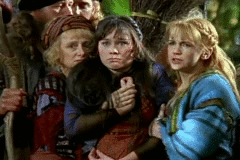
Source: xenagabrielleforever
When Xena first lays eyes on Gabrielle. And she’s immediately struck by the sight of this farm girl - brave and foolish - who throws herself at Draco’s men in exchange for the safety of her fellow villagers. And I swear in that moment you can hear the rusty hinges on Xena’s heart creak slowly to life in knowing anticipation, as Gabrielle unwittingly takes a chisel to Xena’s defenses.
Or here. When Xena lets herself be distracted...

Source: hyxenagabrielle
The Warrior Princess. Confident and sure and untouchable. Completely disarmed by some young thing in some podunk village somewhere. Completely at the mercy of soft green eyes and youthful round cheeks and strawberry-blonde hair. Mesmerized by the tickling sensation of recognition as it cascades across her body when their eyes finally meet and hold.
Or, this gift of a scene. When Gabrielle wants so desperately to tag along with Xena.
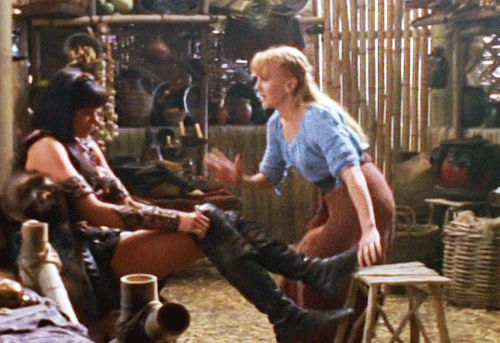
Source: jadedownthedrain
And the entire time she might as well have a neon sign hanging above her head that flashes ‘Only Gay in the Village!!!’. Not that Xena isn’t immediately aware of this fact. She knows precisely everything she needs to know about this girl sitting in front of her. She knows it deep in her marrow. A long forgotten instinct dancing and swirling to life in the sleepy valley nestled between her lungs.
And here, just a few heartbeats later. When Xena pretends to act as if she doesn’t actually want Gabrielle to tag along.
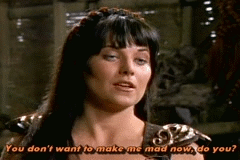
Source: xenagabrielleforever
Only she does. Desperately. Except, she doesn’t know what to do with that feeling. So she drapes it in casual indifference and accessorizes it with empty threats, all the while secretly hoping that this inscrutable farm girl understands, is up for the challenge, feels the undercurrent too. And Gabrielle does. She tastes it on the air. Her blood is buzzing with anticipation. Make her mad? Of course, that is exactly what Gabrielle wants. No, not the ire, but the feel of the thrum that will course through Xena’s veins when her heart is set to pounding and her chest to heaving. Gabrielle wants to wield the mallet. Wants to see the fire in Xena’s eyes directed squarely at her. Wants to know the intensity of Xena’s scrutiny. She wants all these things very much. Even if she doesn’t quite know it yet.
Then of course there is this scene. When Xena is raw and vulnerable and exposed…
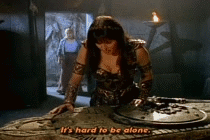
Source: xenagabrielleforever
And Gabrielle just steps from the shadows, like sunlight slicing through a storm cloud. Like her heart is saying: ‘I’ve been whisperin’ to you through the ether, listenin’ to your cry.’ And goddamnit, if they haven’t finally found each other again. This is a fucking homecoming! Of course I wanna talk about it!!!
But then there’s this. These two fools are already in love, can’t you see?!?
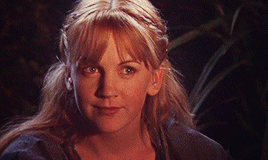
Source: hyxenagabrielle
But they’ve always been in love and they’ll always be in love. It’s muscle memory, the way one holds the other’s gaze. The smile that forms on their lips. The warmth that colours their cheeks. The pull, the pull, the pull. The inevitable surrender. The glorious fall. And somewhere back at the beginning of time and somewhere in the future when it all ends and here in this moment they just fucking know: ‘You were whisperin’ through the ether, letting me know you’re mine.’
All these moments. All these things. All of it, I want to talk about all of it. And maybe one day I’ll have more to say. But, right now I want to talk about Gabrielle’s prognostication skills.

Source: xenagabrielleforever
I’m being serious, though. I know this scene was played for laughs - Gabrielle says ‘do her’ and everyone giggles like a fifth-grader. It’s just an off-hand comment that Gabrielle tosses out there to get herself out of a tricky situation. Just a bit of inconsequential fun. Only it’s not inconsequential at all, it’s fucking prophetic.
And I’m not just talking about the fact that one day Gabrielle will actually get close enough to Xena to ‘do her’ - yes, that kind of do her, and ohmygod, just...
<ASIDE:> THIS BEAUTIFUL ASSHOLE SHOW KNEW EXACTLY WHAT THE IMPLICATIONS WOULD BE BY USING THAT LINE, THE SHOW FUCKING KNEW AND IT WENT THERE ANYWAY. GLEEFULLY. LIZ FRIEDMAN, WAS THIS ONE OF YOUR SCRIPT NOTES? LIZ? LIZ! LISTEN LIZ, IT’S OKAY, YOU CAN TELL ME. BECAUSE IT WAS A CHOICE, AND BOY WAS IT. A. CHOICE. SO, FAM, DON’T LET ANYONE TRY TO TELL YOU THAT THE SUBTEXT WASN’T THERE FROM THE BEGINNING. IT WAS THERE AND IT WAS DELIBERATE, AND YOU CAN FIGHT ME ON IT. </ASIDE>
No, I’m talking about the fact that this silly little throw-away scene both perfectly distills the essence of Gabrielle’s character - clever and unstoppable and pure-of-heart - and encapsulates the show’s most tender truth. And that is this: Gabrielle, the unsuspecting and innocent farm girl from Poteidaia will do the one thing that certainly no man - though handsome and strong and commanding - and, arguably no one ever, has been capable of doing. She’ll slip past Xena’s defenses and completely disarm her. Not physically, of course, but emotionally. And not to do harm, but to love unreservedly. Through all the changing seasons of their lives. For all of time. And the fact that this very poignant and romantic and fundamental truth is draped in humour and accessorized with innuendo makes it all the more perfect for a show that, on its surface, is campy and sexy and ridiculous, but at its core is tender and earnest and profound.
But, ohmygod, is it ever a wild ride. And Gabrielle, sweetie... you precious baby gay, giddy the fuck up.

Source: hyxenagabrielle
UP NEXT: Chariots of War
#xena warrior princess#xena#gabrielle#xena and gabrielle#xena rewatch#season 1#s01e01 sins of the past#SotP#xwp#otp: for i am dying of such love#let the gay begin#diablog
56 notes
·
View notes
Photo

This one is going to be really long because I’ve add more then one sketch. I’m still so glad you all are enjoying my little narrative.
- Virgil has now put Patton and Roman on the ground so they could better converse with Logan. Virgil remained on his knees as he continued to shrink back down.
Roman: “Logan! Where have you been?”
Logan: “I’ve been back here waiting for Patton and Virgil’s return and I suppose your own as you remained outside looking for them as well.”
Patton: “How did you even know we would come back?”
Logan: “Patton, you are quite adapt at emotionally supporting others and it was obvious that, even though not the strongest bond, you had made a connection with Virgil. Thus, it was only logical to conclude you would be able to convince him to return.”
Patton: “Awe Logan that’s so sweet of you to say!”
Roman: “I had no idea you had so much confidence in Patton, Logan.”
Logan: “Of course I do, otherwise there’s no way we would be able to work well as a team.”
Roman: “I guess that makes since.”
Logan: “I’m glad to see you’ve matured as well Roman. Now I no longer have to worry about you being the hot-headed, quick to action team leader.”
Roman: “Yeah, yeah I get it! I jumped to conclusions and made a terrible mistake that could have put us all in danger. I’ve reflected on my actions and cooled off a bit.”
- Roman crossed his hands and turned his line of sight away from Logan as he sulked. Logan gave a little huff of amusement at Roman’s reaction, but then directed his attention to the slowly shrinking mini giant before him.
Logan: “Fascinating.”
- Virgil’s ears puckered up at that word and he locked eyes with Logan, who was walking towards him at a natural pace. Virgil wasn’t sure what to do, but thought it best just to stand still as Logan wasn’t armed and he felt no hostility directed towards him either. Still, he felt a slight chill crawling down his back and drips of sweat begin to form on his forehead.
Logan: “To think you had the ability to size-shift and was able to hide it so well from us.”
Virgil: “I’m really sorry I hide it bu-”
Logan: “No need to be sorry, it only makes sense that in this new environment full of strangers that you would have at least one secret.”
- Virgil was unsure of how to take such a monotone response, but he felt Logan was at least not frightened by him.
Logan: “Now let me get a closer look.”
- Logan walked around the mini giant, looking at him up and down until he made a full circle. He then pulled out a pen from his shirt pocket and a screen popped up in front him. It seemed like he was taking some kind of notes.
Logan: “Virgil.”
Virgil: “Yes?”
Logan: “I have some questions I’d like to ask you, can you do that for me?”
Virgil: “Sure.”
Logan: “Good. Now tell me, can you maintain your current height or do you have to return to a “normal” height in order to grow again?”
Virgil: “No I can stop the growing and shrinking at will, if my emotional core is stable.”
Logan: “Understood, then please maintain your current height.”
- Virgil was a little surprised at the unusual request, but did as he was asked.
Logan: “Excellent. So Virgil have you always had this ability to size-shift?”
Virgil: “I’m not really sure. Sorry.”
Logan: “No it’s alright. Let’s see, can you tell me what might have induced this change?”
- Virgil froze up at that question. In an instance memories of the Hell he had lived through came flooding into his mind. He gripped his shoulders tightly and began to rock back and forth as panic started to swallow him whole. Logan and Roman remained in place confused and shocked at the sudden shift in behavior. Patton, however, sprung into action.
Patton: “Virgil, Virgil, hey snap out of it! You’re safe kiddo, you’re safe. No one can hurt you here and no one will.”
- Patton had latched himself onto one of Virgil’s hands and began rubbing his back. Then, just as suddenly as it started, Virgil stopped rocking back and forth and loosened his grip on himself. It would seem he was able to hear Patton calling out to him. He looked down at Patton with a relieved face covered in sweat. Patton though was visibly concerned still, but managed to break out a petite smile of reassurance. Virgil, then turned his head back towards Logan to answer his last question.
Virgil: “Escape.”
Logan: “Pardon?”
Virgil: “I wanted to escape from that place and those people so I ran. I just kept thinking about it until the next thing I knew you all found me outside and shrunk down. After that I’d sneak off on my own to test out this ability of mine. I needed to make sure I wasn’t going to return to my original size all of a sudden. Luckily, I found out I could control it, but only when I remained calm.”
Roman: “So that’s why you were always keeping your distance and sneaking off at night. Here I thought you just didn’t like us.”
Virgil: “No, it was never that I didn’t like you all but I couldn’t risk you all possibly getting hurt if say I suddenly started growing inside one of the buildings.”
Patton: “Geez kiddo, you really are just the sweetest.”
Logan: “I’m sorry for my previous question Virgil. I didn’t mean to elicit such a response.”
Virgil: “It’s alright, I understand.”
Logan: “With that being said I’d like to know if you’ve ever tried to grow beyond your set height?”
Virgil: “Beyond my set height? You mean seeing if I could grow past a certain point? No I haven’t tried that, I never really had a reason too.”
Logan: “I’d like to try it if you’re up for it. I think having this data can help us in battle, but also will allow you to better understand your ability as a whole. You maybe able to even gain more control over it.”
Virgil: “I-I’m not sure. I don’t want to be looked at as a monster anymore then I already have.”
Logan: “Patton can I please ask for your help here.”
Patton: “Okay. Virgil, I can understand where you’re coming from but I’d like you to trust Logan, to trust us. Trust that no matter what we really are family and we won’t make you feel like a monster ever again.”
Virgil: “Al-alright.”
Logan: “Then it’s decided. Please follow me.”
- Virgil stood up at his maintained height of 9 feet tall and slowly followed Logan into what was referred to as the facility. Logan then directed him to stand on the ‘X’ marked in the middle of the room and asked Patton and Logan to stand to the fair side of the room to observe. Logan remained near Virgil.
Logan: “Virgil can you tell me what your original height is? I’d like to use it as a baseline.”
Virgil: “Sure it’s 50 feet tall.”
Logan: “I see, so you’re the smallest of the Dark Sides.”
Virgil: “Yeah.”
Patton: “Is that true Logan?”
Roman: “Yeah, I had no idea you had that kind of data on hand. How did you even get it?”
Logan: “I record all our battles and had my custom computer program calculate the exact height of both Deceit and Remus.”
Roman and Patton: “WHAT?! I HAD NO IDEA!!!”
Logan: “Yes well, it wasn’t very useful data in the long run but now with Virgil here it may become of some use.”
Virgil: “Really?”
Logan: “Yes! What I’ve discovered is that both Deceit and Remus are stuck at their set heights. They don’t fluctuate like we previously surmised, but Virgil is a whole other case. He can change his height by will and if my current hypothesis is correct he can out grow both of the other Dark Sides.”
Virgil: “I could out grow them?”
Logan: “I believe so. At first we thought that because of their unstable emotional cores that their size would be just as erratic, but that’s not the case. Deceit has always maintained a height of 70 feet and Remus at 150 feet. Thus, I believe Virgil has always been fundamentally different from them.”
Patton: “You think Virgil can grow even bigger then 150 feet tall?!”
Logan: “I do, but we’re about to find out definitively if he can or not right now. Virgil, I’d like you to grow to your original height of 50 feet and do pick me up as well.”
Virgil: “Sure, but why do I need to pick you up?”
Logan: “I want to take a body scan of you as you grow to record what exactly is happening to your body when you size-shift.”
Virgil: “Alright then, let me just get a little bigger so I can hold you properly.”
- Virgil then took a deep breath and exhaled to calm his nerves. He quickly shifted from 9 feet to 12 feet tall. He then bent down to pick Logan up into his arms and wait for the okay from Logan to keep going.
Logan: “Okay, everything’s set so you can start growing to your original height.”
- Virgil gave a nod and started growing rapidly in size, not even stopping once until he reached 50 feet in a matter of seconds. He was still a bit nervous about Logan as he had to move him around slightly as he kept growing.
Virgil: “There, 50 feet.”
Logan: “Good, how do you feel?”
Virgil: “Fine I suppose.”
- Virgil glanced over to the far side of the room where Patton and Roman were and gave them a smile to show he was okay. Both of them smiled back and gave two thumbs up for encouragement.
Logan: “Now I need you to start growing again and don’t stop until you can’t grow anymore.”
Virgil: “Ah wait. Since you already have your body scan could I please let you down now. I don’t feel you’ll be completely safe being near me if I actually can grow past this point.”
- Logan gave a small sigh of disappointment, but understood Virgil’s point.
Logan: “Alright. Take me over to where the others are and then return to this marked area and proceed.”
- Virgil did so and placed Logan alongside Patton and Roman, and returned to where he was before.
Roman: “Welcome to the observation club Logan.”
Logan: “Put your joking aside, I need to concentrate.”
Patton: “I know you just wanted to be held longer, but there’s no need to be so grumpy Logan. We all got our turn after all.”
Logan: “ I didn’t want to-”
- Logan stopped mid-sentence as he figured remaining silent on the topic was the best course of action. Even though his face was slightly flushed red.
Virgil: “Here goes.”
- Virgil closed his eyes and imagined his body expanding past his current form. This was a similar mental technique he used to shrink, but in reverse.Though he wasn’t sure if he was actually growing or not until he heard a gasp break through the silence. Next thing he knew, BONK! He had hit his head on the ceiling of the facility.
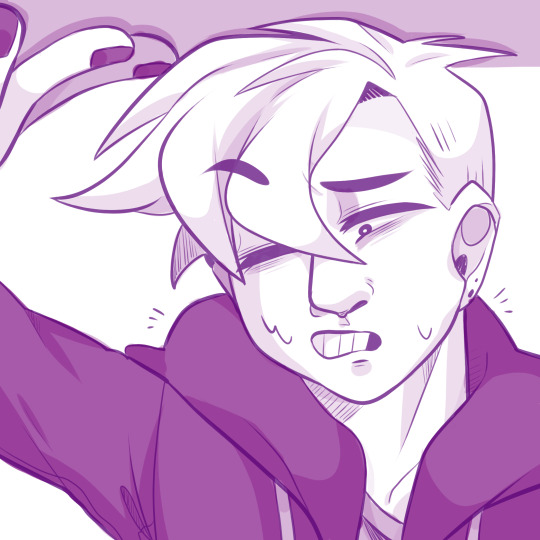
Virgil: “Ow, okay that hurt.”
Logan: “That maybe so, but it seems like my hypothesis was correct. You do have the ability to grow past your set height, how interesting.”
Patton: “Are you okay kiddo?”
Logan: “Yes, let me know how you feel. You should be currently standing at 100 feet, so you’ve already doubled your size.”
Virgil: “I’m okay. I feel a little dizzy, but that might be because I just hit my head just now.”
Logan: “Yes, it would appear that if you hadn’t been stopped by the ceiling you would have grown even taller. This time get down on your knees and keep your eyes open.”
Virgil: “You want me to keep going? What if I out grow this building? You guys could get seriously hurt!”
Logan: “No need to worry. Even I would be surprised if you could out grow this facility. While the ceiling may only go to 100 feet the width is over 1000. Usually this place is my lab, but I’ve cleared it out specifically for this experiment. Additionally, we are standing by one of the exits so if an emergency does occur we won’t be trapped inside here.”
Virgil: “Alright, then I’ll keep going and I won’t stop this time.”
- Virgil got down on his knees and began again. This time he started with his eyes closed, but opened them soon after. He watched as he continued to grow looking around at his ever shrinking surroundings. He even took a quick glance towards his friends at the back of the room, but was frightened at how small they kept on getting and looked away. He then turned his eyes towards the ceiling and shockingly realized how close he was to hitting it once again.
Logan: “Amazing, he just keeps on growing.”
Patton: “Hey Logan shouldn’t we stop this. Virgil’s not looking so good and just now his expression when he looked at us wasn’t pleasant. Besides, it looks like he’s about to hit the ceiling again.”
Roman: “Yeah, doesn’t that mean he’s doubled his height yet again? Even if you decide to keeping going with this test of yours, you should at least tell him to change his position.”
Logan: “You’re right. VIRGIL! I NEED YOU TO LIE ON YOUR STOMACH NOW AND KEEP GOING!”
- Virgil was surprised by the sudden shouting, but did as he was instructed. He lied down on his stomach and kept growing. The dizziness he had felt before wasn’t going away though, if anything it was getting stronger. Suddenly, a strong pulsing sensation spread throughout his body. It was similar to when his emotion core ran wild, but also different as it didn’t cause him any pain.
*beep* *beep*
Logan: “What?”
Patton: “Logan what’s going on?”
Logan: “My scanner is picking up something abnormal happening inside of Virgil’s body.”
Roman: “Abnormal, what does that mean?”
Patton: “Virgil’s not hurt is he?”
Logan: “Calm down both of you, no it’s perfectly fine it’s just that…something is about to happen.”
- With that final comment yet another pulse surged through Virgil’s body. Suddenly, his growth rate, that had slowed down began to accelerate drastically. By the end of it the three who were all the way in the back of facility were now face to face with a massive, 1000 foot tall Virgil.

- Roman had fallen down from the shock wave created from the sudden expansion. Logan was completely frozen in place stunned by this unexpected development. Patton was waving his hands and shouting at Virgil to check if he was okay. Virgil, on the other hand was far from okay. He was now stuck in place as his massive frame was pressed up again every corner of the facility. His breathing was shallow and his vision had become blurred. Virgil could barley make out the form of his friends right in front of him. All he knew was that they were extremely small now. He knew he needed to be careful of any slight movements he made.
Patton: “VIRGIL! HEY! ARE YOU OKAY? CAN YOU HEAR ME?”
- Virgil could hear Patton shouting at him, but couldn’t make out all the words clearly. However, he could tell that Patton was worried about him, but had no idea how to respond to his calls. He was too big to speak without causing some kind of damage so he decided to take a gamble and blink once for yes.
Patton: “VIRGIL! ANSWER ME PLEASE!”
Logan: “Patton it’s alright.”
Patton: “What do you mean it’s alright? Look at him! He looks like he could pass out at any moment? I don’t even know if he can hear me or see me!”
- Patton started sobbing from the stress.
Logan: “Patton look Virgil is responding to you.”
Patton: “What?”
Logan: “At his size he knows he can’t verbally communicate at the risk of causing us harm so he’s been blinking a few times now. My guess is one blink means yes and two means no. From what I’ve gathered he can hear you and he is okay.”
Patton: “Oh thank goodness.”
Logan: “Now that we have some sort of communication established, VIRGIL! IS THIS SIZE YOUR LIMIT?”
- Virgil blinked once for yes. Not just because he was stuck but the pulsing he once felt had completely stopped and he was too exhausted to even shrink back down right now.
Logan: “So this is his limit, still it’s amazing to behold. 1000 feet is nothing to scoff at. VIRGIL? ARE YOU ABLE TO SHRINK BACK DOWN?”
- Virgil blinked twice for no.
Patton: “He looks exhausted. I don’t really want to leave him here like this, but he needs to rest first.”
Logan: “You’re right. Whatever, happened in those last moments must have used up the remainder of his energy. VIRGIL! TRY TO GET SOME REST! WE’LL COME BACK HERE IN ABOUT AN HOUR TO CHECK ON YOU, OKAY?”
- Virgil blinked once for yes.
Logan: “Alright, let’s go for now. Patton you can return here after an hour has passed to check on him. I have data I need to sort out and Roman appears to be shaken still.”
Patton: “Okay.”
- Thus, the three of them left the facility. Logan returned to his study to analyze the data he had collected, Roman went to the training area to get his mind back in order, and Patton stayed outside near the facility door pacing back and forth as he waited for an hour to pass by. He had snacks and a blanket with him for when Virgil woke up. Once an hour had finally passed Patton slowly opened the facility door.
Patton: “Hey kiddo you feeling any bet-”
- Patton dropped the blanket and snacks to the floor in horror. Virgil was no longer inside the facility. Frantically, Patton began calling out to Virgil thinking he may just be hiding for some reason.
Patton: “Virgil, Virgil where are you? It’s me Patton, you don’t need to hide! Virgil?”
- Patton was about to go into a full panic when he heard a sudden groan coming from the center of the room. He crept slowly over and was amazed at what he found.
Patton: “Virgil?”
To be continued.
@crystalk17 @suckedinfandoms @paranoidgurl @pattonvirglsanders
#mass emotions ts#gt sander sides#g/t sander sides#gt#g/t#g/t angst#tsart#thomas sanders#massive giant#giant#giant sketch#gt community#g/t community#sander sides au#giant!virgil#size shifting#size difference#virgil#patton#roman#logan#virgil sanders#patton sanders#roman sanders#logan sanders#sanders sides#gt sanders sides#g/t sanders sides#sanders sides gt#sanders sides g/t
392 notes
·
View notes